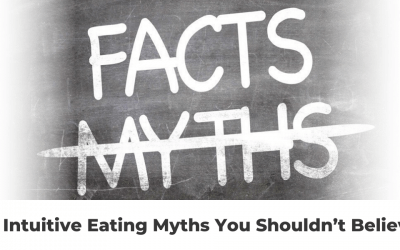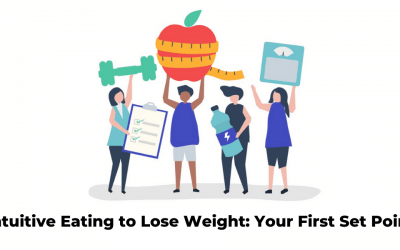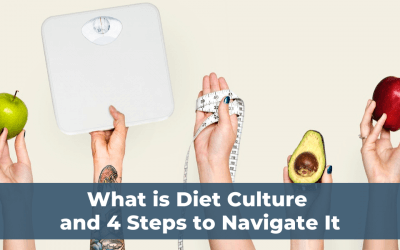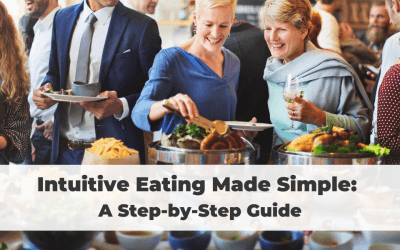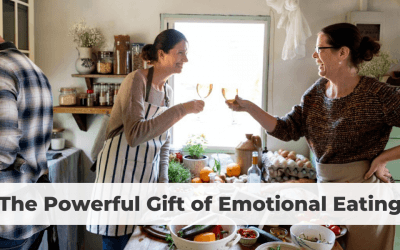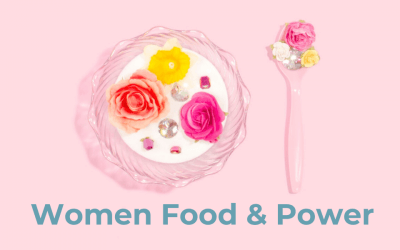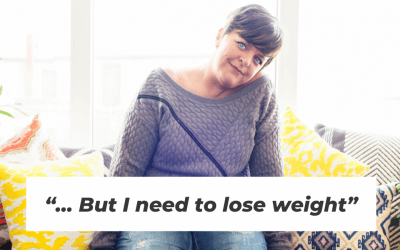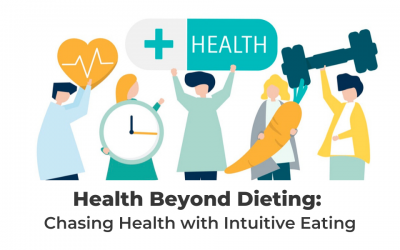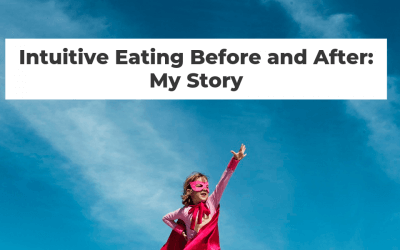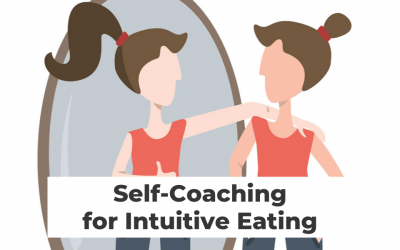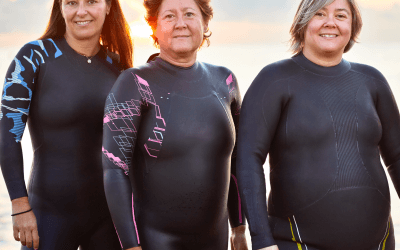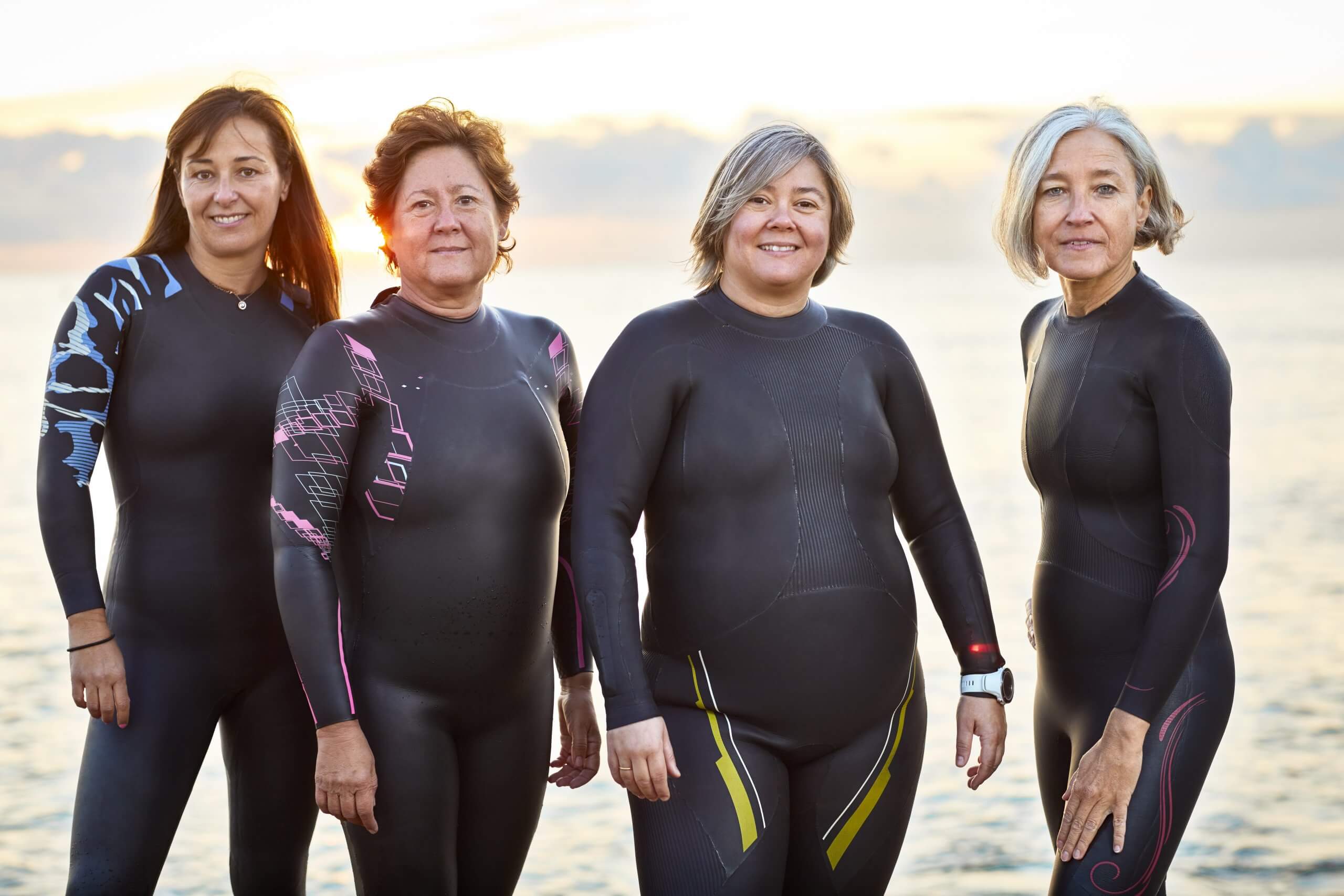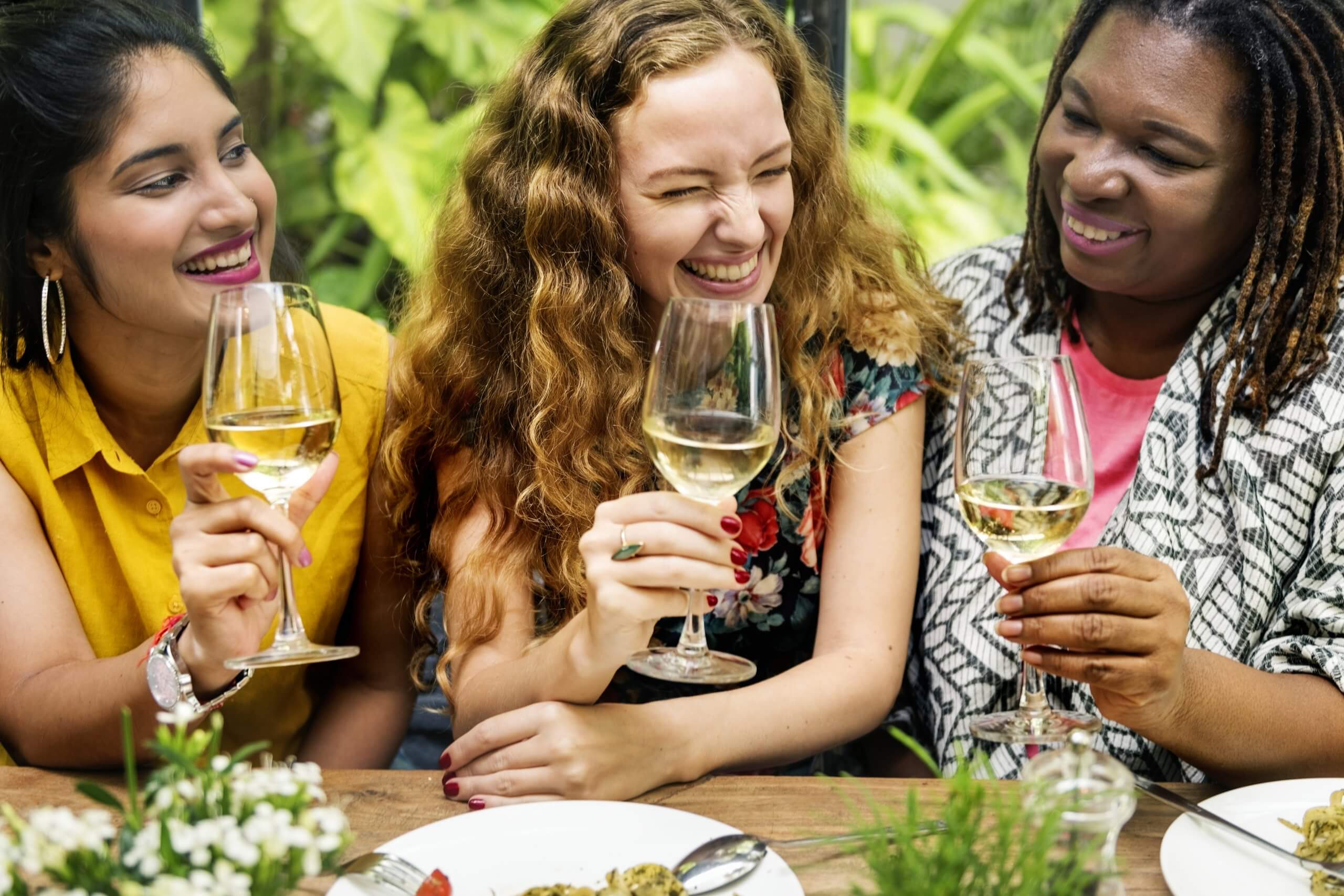

Welcome to
Beyond the Food Blog
A catalog of evidence-based articles written by Stephanie Dodier non-diet nutritionist, educator, and feminist business leader on all topics supporting the non-diet approach that will challenge everything you’ve been taught about food, health, and coaching.
Welcome to
Beyond the Food Blog
A catalog of evidence-based articles written by Stephanie Dodier Clinical Nutritionist on all topics supporting the non-diet approach to health.
Our Most Recent Articles
13 Intuitive Eating Myths You Shouldn’t Believe
These intuitive eating myths come as no surprise since intuitive eating has been named the #1 nutrition trend for the year 2020.
Since it is such a departure from dieting it’s bound to have lots of misconception, fear-mongering (Thank you, diet culture!) and yes false beliefs surrounding this practice.
These myths cause confusion and doubt. As a nutritionist and expert, I get all sorts of questions like:
“Is intuitive eating healthy?”
“Will eating intuitively make me gain weight?”
“Will intuitive eating work for me?”
In this article, I dispel the biggest 13 intuitive eating myths that I’ve come across since I started my own intuitive eating journey. And in the process of debunking these intuitive eating myths, I hope to help you better understand what eating intuitively means and what it can do for you.
Here’s a quick summary of all these intuitive eating myths:
Myth 1: Intuitive eating is unhealthy.
Myth 2: Intuitive eating will make me gain weight.
Myth 3: Intuitive eating means I’ve given up on myself.
Myth 4: Intuitive eating is simply the “eat when you are hungry and stop when you’re full” diet.
Myth 5: You can be a good intuitive eater or a bad one.
Myth 6: You can count macros and still be an intuitive eater.
Myth 7: Intuitive eating means you eat whatever you want, whenever you want.
Myth 8: Intuitive eating is for healthy-minded people. I won’t do it right and I’ll gain weight.
Myth 9: Intuitive eating doesn’t solve my “over-eating problem.”
Myth 10: Intuitive eating doesn’t lead to weight loss.
Myth 11: Intuitive eating will make you binge on food that you shouldn’t be eating.
Myth 12: Intuitive eating is impossible because of food addiction, and certain foods are addictive.
Myth 13: Intuitive eating is only for people with eating disorders.
Before we dive into these myths, let me first explain what intuitive eating means.
What is Intuitive Eating?
The best and most accurate intuitive eating definition I can give is this: “a self-care eating framework that uses your body’s internal cues of hunger, fullness, and satisfaction to guide your eating behavior.”
Note that this is an eating framework, not a diet program. Unlike diets that dull your sensitivity to your body’s eating cues, intuitive eating encourages you to listen to your body and helps you develop trust in your body’s innate wisdom. Intuitive eating is supported by 100’s of studies showing the health benefits of intuitive eating.
Now let’s look into the 13 intuitive eating myths one by one:
Myth 1: Intuitive eating is unhealthy.
This comes mainly from the fact that intuitive eating allows you all kinds of food, even the ones you may consider “unhealthy.”
Fact: Yes, when you eat intuitively, you can all the foods, because part of the intuitive eating process is to give yourself unconditional permission to eat. This means if you start intuitively, you will likely eat the food that you’re currently restraining. Perhaps that’s carbs if you’re doing keto or animal products if you’re vegan.
Now, one interesting fact to understand is that the World Health Organization defines health as “a state of complete physical, mental, and social well-being, not merely the absence of disease or infirmity.”
This means that health is not just all about the food you eat.
Health is also the quality and quantity of sleep you get, your mental health, emotional stability and balance, spiritual health, movement, etc.
Researchers have found that food restriction has negative physical and psychological side effects. This means food restriction affects your mental health.
For instance, studies reveal that women who go on a diet and restrict food have higher levels of cortisol in their bodies. Cortisol is a hormone that our body releases in response to stress. This hormone is linked to higher levels of inflammation, high blood pressure, change in blood lipids, and other negative factors that can adversely affect your health. Also, the restriction has been associated with depression and anxiety.
We also know that scientific studies associate weight cycling with morbid health conditions, meaning that being caught in an endless cycle of restricting and overeating leads to negative health consequences.
So is intuitive eating healthy? The answer is a big YES because it prevents all the negative side effects associated with dieting!
Not only that…Many of the intuitive eating benefits such as lower cholesterol levels, decreased stress, and improved mental health is backed by scientific evidence!
Myth 2: Intuitive eating will make me gain weight.
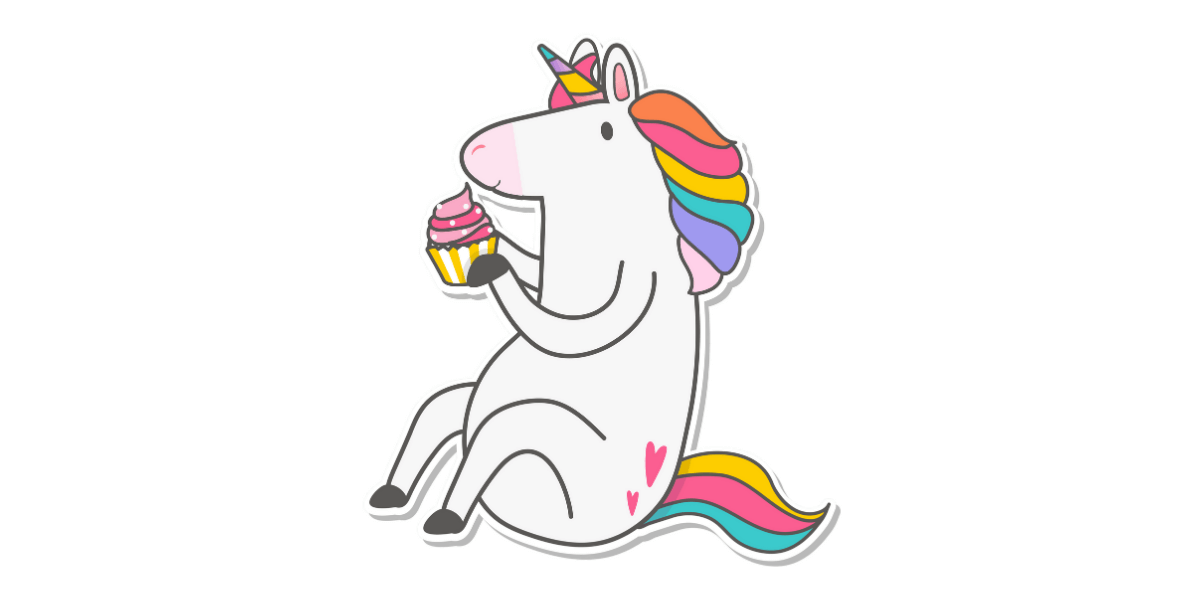

Another version of that myth is intuitive eating causes weight gain.
Now, before I go any further, I want to validate the desire for weight loss that you might have. These are real and consistently encouraged in the society that is laden with weight stigma. Weight stigma is also known as weight bias, weight-based discrimination, and also stereotyping based on a person’s weight.
So it makes perfect sense that you are afraid of gaining weight or that you desire to lose weight.
Fact: Intuitive eating DOES NOT cause weight loss or weight gain all the time. The truth is, none of us knows what the body will do as a result of changing the way you eat. If a dieting coach or guru predicts that you will lose 20 pounds in four weeks as a result of their new diet, that is BS.
We don’t know what’s going to happen with your body when you start becoming an intuitive eater. No one knows except your own body!
But we know that, when you start eating in accordance to your body’s natural hunger and satiety cues, this eating behavior will send information to your hypothalamus, that gland in your brain that regulates the hormone production around appetite and weight regulation.
Your hypothalamus establishes your set point, which is the weight range which your body believes to be healthy for you. Intuitive eating will take you to that weight range.
Now, that weight range may not be what you want. It may not be the “ideal” BMI for you. But your body’s innate wisdom knows it’s best for you.
(You can read my blog post about your body’s setpoint if you want to have a better understanding of the topic. Also, here’s a study that shows that Health At Every Size has more positive outcomes than dieting for weight loss.)
Intuitive eating will not either make you lose weight or gain weight. It will only support doing your body what is best for you.
Myth 3: Intuitive eating means I’ve given up on myself.
Another version of that is “Intuitive eating is lazy” or “Intuitive eating is just an excuse to eat whatever you want and not have to practice dietary control.”
Fact: If you think this myth is true, it means that your self-worth is based on how you engage with food. Likely your self-image is tied to the size of your body or looks and food is the weapon of choice to control your body appearance.
The truth is we were all born worthy. Along the way, someone came and led us to believe that we needed to earn our worth. Perhaps a few years later, dieting came into your life and then you associated a thin body with worthiness.
Then, after a few years of dieting, you associated your eating habits with how worthy you are. Thus, in your mind, eating “everything” meant you weren’t worthy.
Also, people judge those who eat intuitively as “lazy” because they associate their self-worth with dieting or eating “healthy.”
But does intuitive eating mean you’ve given up on yourself and that you’re lazy? Quite the contrary. It means that you are actually trusting yourself and that you have removed your self-worth from the way you look and the way you eat and reconnect to your innate power.
Myth 4: Intuitive eating is simply the “eat when you are hungry and stop when you’re full” diet.
Fact: This seems to be one of the most common intuitive eating myths, because the diet culture is prevalent in our society. When you have this myth in mind, that’s your diet brain speaking to you. It makes you believe that you must control what you eat in one way or another and that you are innately not smart, wise, or good enough to know what you should eat. Your diet brain makes you fall for the next diet or repeat the same diet.
The truth is, intuitive eating is not just another diet. Rather, it’s an entire eating framework. It’s a philosophy that changes your entire relationship with food. There’s more to it than just what you eat, when you eat, and how much you eat.
Intuitive eating is about the entire relationship, what comes before and after. This means changing your perception around how you should engage with food and what it means to be engaged with food. I’ve broken down how to eat intuitively in 5 easy steps.
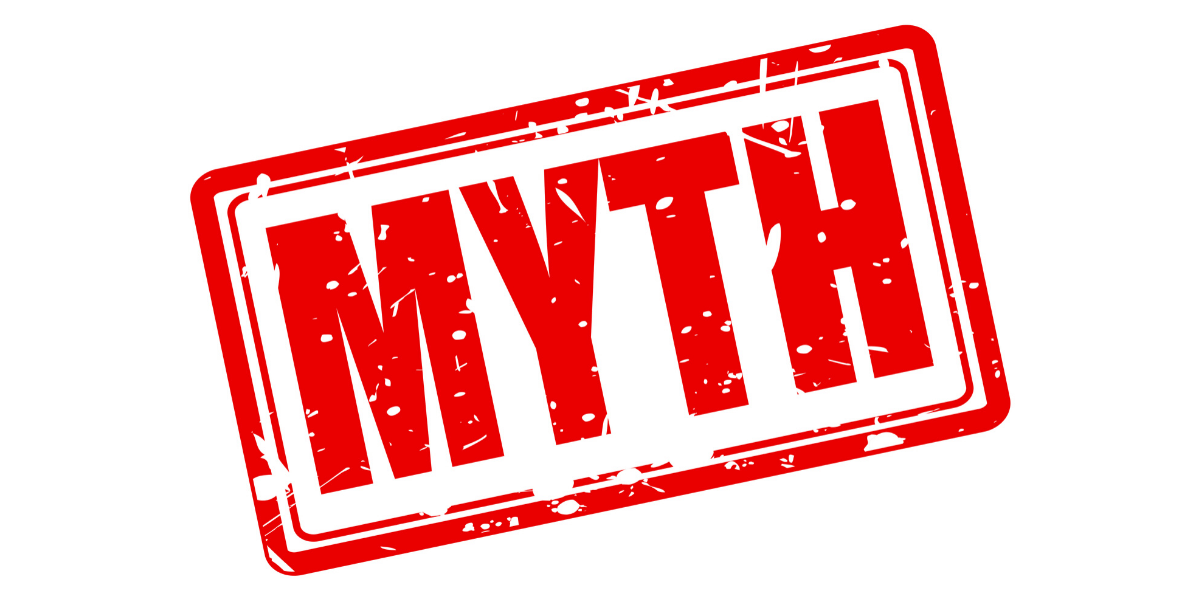

Myth 5: You can be a good intuitive eater or a bad one.
In other words, intuitive eating works for some people and it doesn’t work for others.
Fact: We know that diets don’t work.95% failure rate within 1-5 years. As a result, you have worked really hard at a process that doesn’t and adopting on the way perfectionistic behaviors and an all-or-nothing mindset. With each diet, your brain gets rewired to see food, exercise, lifestyle, health, behavior as good or bad or “all in or all out.”
The longer you diet, the longer you maintain this all-or-nothing frame of mind. I’ve worked with women who are typically 40 plus and that have been dieting at least 10, 15, 20, 30 years. What I’ve found is that this all-or-nothing mindset has spread throughout their entire life.
That’s why Going Beyond the Food Academy is a life-changing process. The first step of the program is to learn tools to shift your mindset away from “diet brain.” Subsequently, this changes the way you interact with your whole life.
Is it possible for you to be good or bad at intuitive eating? The answer is no because intuitive eating is a process, not an end goal. It’s a way of being.
Myth 6: You can count macros and still be an intuitive eater.
As intuitive eating becomes more popular, I’ve been seeing other versions such as keto-intuitive, flexible eating with intuitive eating, vegan intuitive, intuitive cheat day, etc.
Fact: People are getting tired of dieting. Their bodies are getting run down. Their emotions are all over the place. People are looking for another way. And so, diet culture is repackaging and renaming their diet programs so they could fit into intuitive eating because that’s what people want.
However, none of those programs is intuitive eating.
Their diet culture version of intuitive eating is the same old diet programs with “intuitive eating” attached to them. They do this so you’ll feel better about their programs and get you to be more attracted to their products.
Any rule around food is not intuitive eating. When you have rules as to what you should be eating, that means you don’t trust your body. Can you count macros or be keto-intuitive or a flexible eater and still be an intuitive eater? The answer is no.
Myth 7: Intuitive eating means you eat whatever you want, whenever you want.
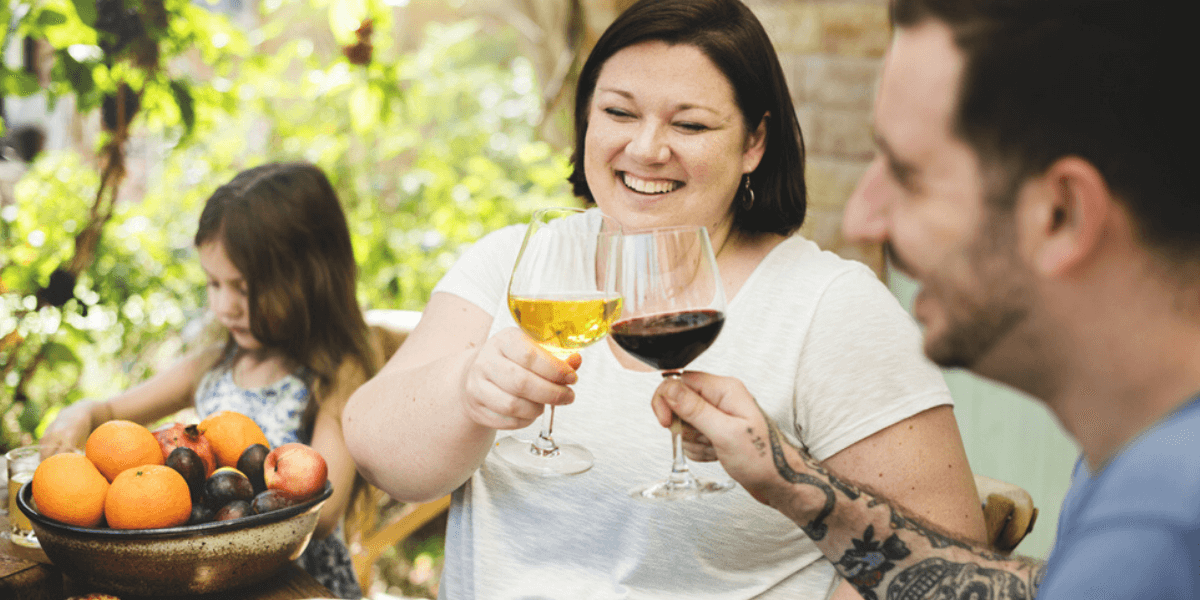

Another version of this myth is “You can’t eat healthy on intuitive eating. Intuitive eating means intentionally eating unhealthy food.”
Fact: In a way, this is true. But then so what? Why is it a problem to eat what we want whenever we want?
Human’s love dichotomy. Labeling good or bad food makes us feel safe… It makes us feel like we are in control which cannot be further from the truth.
When you transform your eating pattern from dieting to intuitive eating, you have to lift all the rules around food.
There’s a period of time, the honeymoon period, from the moment you begin to when you become at peace with food where you’re trying to figure out what it means for you to eat when you want and whatever you want.
I call it in my program the elastic band period, where you go from restricting to finally achieving food freedom. Imagine pulling an elastic band towards you and then releasing it. What would happen? The elastic will go completely the other way. Then, it will rebound to restriction and go the other way again.
Every time it does a loop, it’s going to have less force in it. Then with time, it’s going to stabilize and be back to normal. That’s what happens when you become an intuitive eater.
When you release the rules, your reptilian brain is like “Holy crap. You mean we can eat the carbs we’ve been restricting for years? Let’s eat it all!” That’s what happens.
But it doesn’t last long, because intuitive eating teaches you to respect your body. When you eat too much of the food that was forbidden before, you likely not feel your best. Ever tried to eat donuts at every meal for a week?
You have to satisfy your reptilian brain and to really prove to your body that there are no more rules. Then your body will stabilize itself.
Myth 8: Intuitive eating is for healthy-minded people. I won’t do it right and I’ll gain weight.
Another version of this myth is, “Intuitive eating works only for certain people. I’m different.”


Fact: Intuitive eating is not another diet or a new scientifically-created way of eating. It’s innate in all of us. We were all born intuitive eaters.
Just observe a baby. When she feels hungry, she cries. When you feed her, she stops crying. Then, she stops feeding when she’s full and falls asleep. The cycle begins anew she feels hungry again.
Intuitive eating is simply going back to the way you were born.
Now, why would you feel it’s not for you? Your diet brain is partly responsible for that. It’s saying, “You know, girl, you’ve been dieting for years. Look where you are today. You’re not doing this right. You have to have a lot of restriction and control. Otherwise, you’ll lose control. You’re not good enough to do intuitive eating.”
Is intuitive eating only for certain people? Absolutely not. It’s for everyone because we all have it within us to be an intuitive eater. But if you want to be 100% sure, take the intuitive eating quiz.
Myth 9: Intuitive eating doesn’t solve my “emotional eating problem.”
Fact: There is only one truth around that. Intuitive eating does prevent emotional eating. Now, here’s the thing. I didn’t say solved it. I said to prevent it.
If you find yourself saying that eating intuitively won’t solve your emotional eating problem, again, it’s your diet brain speaking. You have been programmed to seek an external solution to an internal problem. You internally developed the behavior of using food as a soothing or regulate your emotions. This behavior is what we commonly refer to as emotional eating.
And now, you want a quick fix, a formula to come along and tell you how to prevent that. That’s the model of dieting. It’s all external. It’s just about food.
Intuitive eating will not solve the problem of emotional eating… but you will. It’s really up to you. Through the process of intuitive eating, you will figure out why you’re using food to cope with your emotions. Here’s another scoop for you: emotional eating is normal. Emotional eating is a gift when understood properly.
Myth 10: Intuitive eating doesn’t lead to weight loss.
Another version of that is “Intuitive eating can work for weight loss.”
Fact: Intuitive eating is not a weight loss program. The purpose and the goal of intuitive eating have nothing to do with weight management.
Now, because intuitive eating is becoming more and more popular, diet culture has latched onto this trend. It sells intuitive eating as a way to lose weight.
But I’m going to tell you this: if you see intuitive eating being marketed as a weight management program, then it is NOT really intuitive eating.
“… but I need to lose weight” the root causes of the desire to lose weight is what needs to be addressed for most women.
Myth 11: Intuitive eating will make you binge on food that you shouldn’t be eating.
Another version of that is “I’ll eat intuitively, but I’ll just eat junk food.”
Fact: If that’s what your body needs, then yes, you’ll binge on food you shouldn’t eat.
It may make you uncomfortable because you might believe that your body does not know what it needs. Thus, you might be thinking that you need to rely on someone or something else to tell you what your body needs.
The part of the intuitive eating journey is coming back to a respectful relationship between you, the spirit, and your body. This means that you do support your body through healthy behavior. In response, your body supports you through life.
When you experience a desire to binge or overeat, it’s because your body is trying to tell you something. The body is trying to point out to you that you are in a state of imbalance, that is something inside you is not okay, and it needs to comfort itself through food.
So does intuitive eating lead you to binge on food you shouldn’t eat? The answer is no. But it does make you more aware of the messages that your body tries to send you.
Myth 12: Intuitive eating is impossible because of food addiction, and certain foods are addictive.
Now, among the intuitive eating myths, this is a loaded one. Before anything else, if you are currently holding the belief that there is such a thing as food addiction or sugar addiction, I would refer you to episode 153 of The Beyond The Food Show. We had a food addiction specialist actually do a complete analysis of my eating pattern and my eating history. I shared all the results publicly with everyone via the podcast and a video interview.
She came to the conclusion that the Going Beyond the Food Method was extremely effective in healing or helping people to overcome what they believe to be sugar addiction or food addiction.
Fact: The belief that food can be addictive is debatable. At this time there is no study demonstrating human addiction to food and sugar.
The only study showing demonstrating evidence of sugar addiction in a rat model and researcher came to the conclusion that sugar addiction in the rats was only present when sugar was restricted.
If you’re currently thinking you are addicted to food and or sugar, I highly recommend that you seek help immediately.
Is intuitive eating impossible because of food addiction? The straight answer is no. But if you struggle with food or sugar addiction, there’s a deeper level of work that you need to do before you can actually become an intuitive eater.
Myth 13: Intuitive eating is only for people with eating disorders.
Fact: No. In fact, it is not, because intuitive eating is the natural way that humans engage with food. We were all born with this propensity.
Now, intuitive eating is used in the treatment of eating disorders. Why? Because it’s very effective. People who suffer from eating disorders are actually not connected to the innate cues of hunger and fullness and satisfaction. They use food in a disordered way to meet their unfulfilled needs.
When your eating behavior is causing harm to you physically, emotionally, or mentally, that’s when you need to seek professional guidance and help immediately.
Intuitive eating is not only for eating disorders, although it is used to treat eating disorders. It is for ALL of us.


Bonus: Myth 14: Intuitive eating has no scientific basis.
Fact: This is by far the easiest of all intuitive eating myths to debunk. Intuitive eating is a proven and well-researched eating framework. As of today, there are well over a hundred intuitive eating research studies published, most of them peer-reviewed, that demonstrate the efficacy of intuitive eating.
To this day, there is not one scientific research that shows any kind of danger associated with this eating framework.
Intuitive eating has a scientific basis. There will be more research around it as more and more people become intuitive eaters.
Ready to Begin Your Intuitive Eating Journey?
Now that I’ve debunked all these intuitive eating myths for you, I hope you have a better understanding of what eating intuitively really is. So how do you feel about intuitive eating now? Are you ready to start becoming an intuitive eater?
Here’s what I recommend that you do: First you can access all of our services on our work with us page. We have a number of programs and service levels enabling us to serve most women:
Free Resources and Masterclasses: Get started and get to know us better!
Private coaching with Stephanie and her team Stephanie and her team of Certified Non-Diet Coaches are waiting to support you in a one-to-one setting with an individualized plan.
Undiet Your Life group coaching program is for women to learn how to eat intuitively, become body neutral, and learn self-coaching at their own pace while being supported in a group setting by Stephanie and her team of Certified Non-Diet Coaches.
Non-Diet Coaching Certification for professionals ready to integrate the Going Beyond The Food Method™️ in their practice and for women wanting to become Certified Coach and build a business coaching other women beyond the food.
Intuitive Eating to Lose Weight: Your Set Point First
“I’m done with dieting… I’ve had enough. I can’t go on one more diet!”
You’ve probably said that at one point. You start looking for an option. Then you find intuitive eating, and it sounds interesting! No more food restriction. You follow your hunger and fullness cues instead of counting calories. You want to try intuitive eating to lose weight… because food freedom sounds oh so appealing and exciting after years of dieting!
More and more women are turning to intuitive eating these days. It’s “cool” to be anti-diet, and even cooler to be an intuitive eater. Intuitive eating has been proposed as the next big “diet trend” in the next decade ahead…and that’s a big problem!
Typically, when we refer to “diet trend,” we refer to ways of eating to achieve weight loss. That’s what we expect, and for most of us, that’s what we seek. We think we need to lose weight. Notice that the keyword here is NEED. We want to lose weight and we don’t want to diet anymore so intuitive eating seems to be the perfect option.
It’s normal to want to lose weight
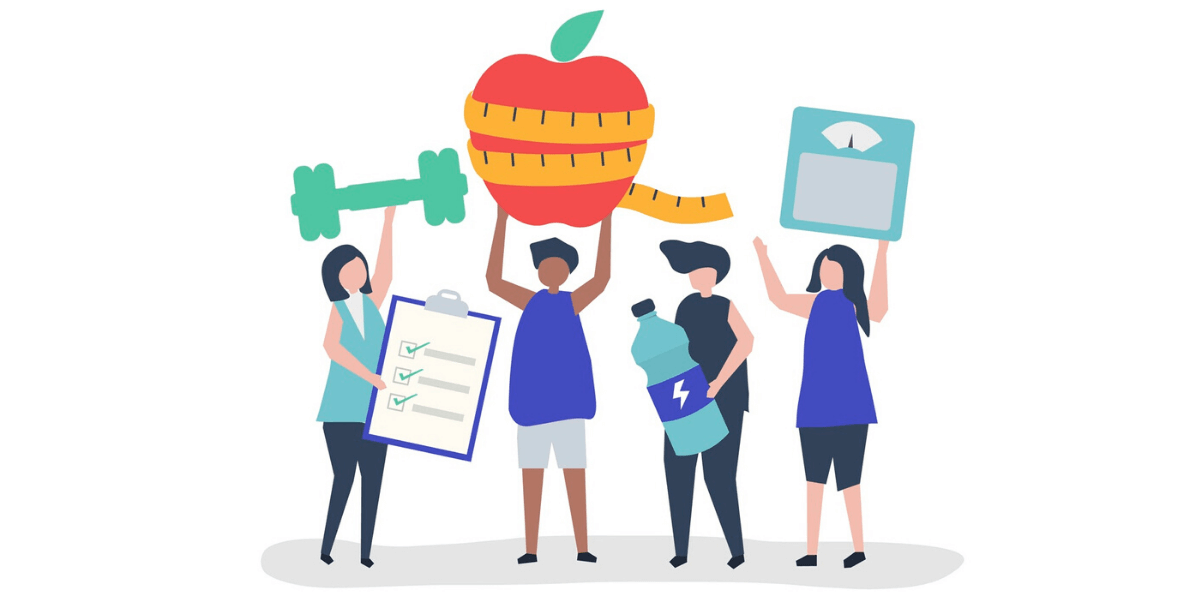

I want to validate those weight loss desires. Those desires to modify your body to fit the “thin ideal” are real and constantly encouraged in a society that is laden with weight stigma and fatphobia. It makes perfect sense that you have that desire and that you think you need to lose weight.
If you find yourself asking the question, “How can I practice intuitive eating and still lose weight?” then this post is for you. And so, I’m writing this blog post to help you understand what intuitive eating is about, how your body maintains a certain weight through your set point, why it’s useless to fight against this mechanism through dieting, and what you can do instead.
You will learn:
Will intuitive eating lead to weight loss?
Homeostasis and happiness set point theory
Identifying and manipulating your set point
How to get started with Intuitive Eating
What is Intuitive Eating?
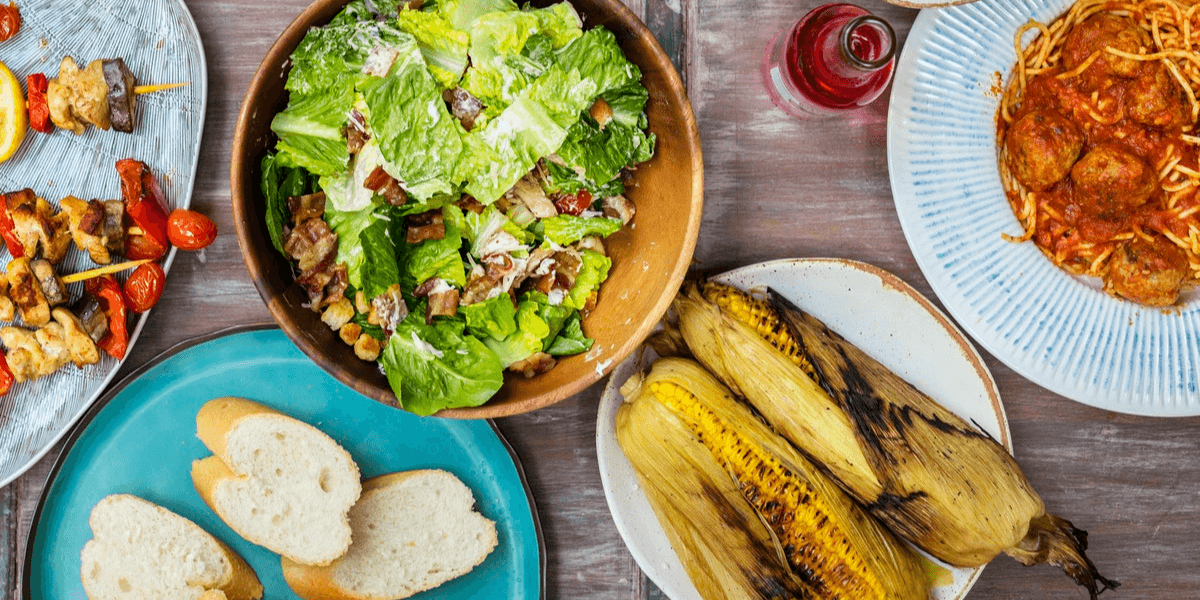

If people ask for an intuitive eating definition, this is what I usually give them: “a self-care eating framework that uses your body’s internal cues of hunger, fullness, and satisfaction to guide your eating behavior.” Notice that this definition emphasizes the body attunement element of intuitive eating, meaning that you need to listen to your body in order to eat intuitively.
This approach to eating allows you to develop a healthy relationship with food and your body. It teaches you to trust your ability to meet your own needs, distinguish between physical and emotional hunger, and ultimately develop body wisdom.
Should you try intuitive eating to lose weight?
If someone who claims to be a health professional tells you that you’ll lose weight with intuitive eating, run the other way! No health professional can rightly claim that Intuitive Eating leads to weight loss. I’ll explain why.
Rejecting the diet mentality is the first principle of intuitive eating. Focusing on weight loss will only hinder your progress as an intuitive eater.
Does that sound surprising? Well, it shouldn’t if you understand what eating intuitively means.
Intuitive Eating is based on interoceptive awareness or the ability to perceive physical sensations inside your body. This means, to be able to eat intuitively, you need to connect with your body and listen to your body’s “messages.”
In contrast, focusing on weight loss is based on external rules. It dulls your interoceptive sense and leads to body-doubt. It makes you think that something is wrong with you just because you’re not losing weight as you expected. Thus, you’re likely to think that intuitive eating “doesn’t work.”
While it’s true that some people lose weight when they eat intuitively, weight loss is more of a side effect rather than the focal point of intuitive eating. Some people who eat intuitively don’t lose weight, and that’s okay. Intuitive eating is weight neutral and is aligned with the Health At Every Size approach. (For more info on this approach, I recommend that you read the Health At Every Size book by Linda Bacon.
Time and again, research has proven that dieting for weight loss is not sustainable. Besides, it causes more harm than good to your body and mind. Dieting increases the risk of eating disorders, binge eating, weight cycling and weight stigma.
Intuitive eating to lose weight? Your set point first.
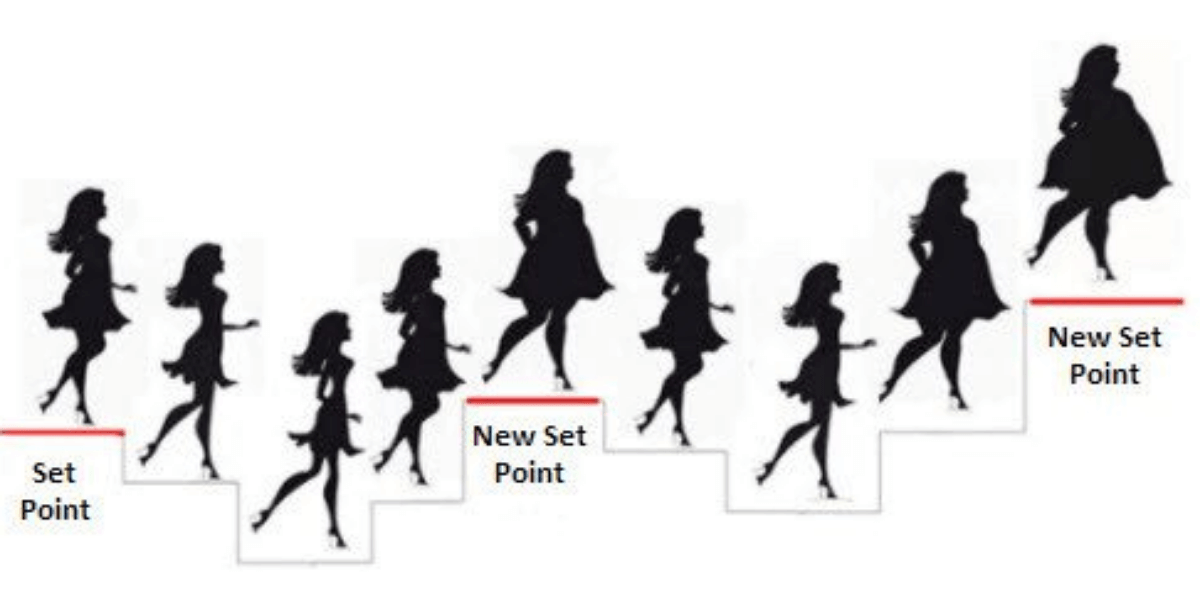

Think of your set point like a natural mechanism that your body uses to maintain a natural weight. This mechanism runs without your intervention. It’s just like how your lungs manage the appropriate amount of oxygen for your body or the way in which your heart manages your blood pressure.
Another fascinating analogy is how your brain automatically gets you steady on a bike even if it’s been 10 years since your last ride. It just happens without you having to think about it. Set point manages your weight in the same way.
In her book Health Every Size, Dr. Lindo Bacon describes our set point as the fat thermostat in our bodies. Your set point acts just like a heat thermostat in a room. When set to a certain temperature, the thermostat will send a message to the heating system to activate when below a determined temperature.
Your hypothalamus is the region of the brain that controls the system in your body that regulates your set point. It sends messages of hunger and fullness to manage your weight. Set point will make you think of the cookies in the cupboard and will also make you say no to the pizza when you’re full.
Our set point manages all the various components in the complex human body that create our body weight. Your set point is your ideal body weight, the body weight you manage naturally without food restriction, deprivation, and over-exercising. It is your weight between diets, the weight at which you can live a non-food or exercise-obsessed life.
The set point is the body’s internal system to maintain healthy weight. One 1970s research study showed that the average weight of a 60-year-old man was only four to five pounds more than the average 30-year-old man. That kind of weight maintenance is no accident and not the consequence of dieting either.
Set Point example
Dr. Bacon has this very powerful example in her book, Health at Every Size:
“Just consider a 50-year-old woman who weighs about five pounds more than she did when she was 20. If she eats about 2,000 calories a day over the course of 30 years, she takes in about 22 million calories. Since five pounds of body fat stores about 17,500 calories, that means that her body was just 0.08% off in balancing energy in versus energy out. This amounts to a difference of about 50 calories per month—less than the calories in one egg!” – Bacon, Linda. Health at Every Size: The Surprising Truth About Your Weight (p. 12).
Our set point can fluctuate during our lifetime. Currently, research estimates the fluctuation to be between 10 to 20 lbs. Set point fluctuates so it can maintain homeostasis.
If you are ready to explore Health At Every Size, you can download Dr. Bacon’s manifesto here.
Homeostasis and happiness set point theory
Homeostasis is the ability of the human body to maintain a stable environment. It’s key to our survival. The body’s magical ability to adapt to its environment at any given condition is what allows us to survive.
This ability to maintain balance is what maintains a stable body temperature, stable blood pressure, stable level of iron, blood glucose…and yes, body weight. All of these biological systems focus on maintaining homeostasis, a.k.a. balance, so we can survive and thrive in our environment.
It even goes beyond the physical body. Homeostasis is also what creates your thoughts and emotions. Your mind responds to its emotional environment as well.
The happiness set point theory is almost similar as the body weight set point theory. It suggests that our level of subjective well-being is determined primarily by heredity and by personality traits ingrained in us early in life. As a result, it remains relatively constant throughout our lives. Our level of happiness may change temporarily in response to life events. However, it almost always returns to its baseline level.
For humans, homeostasis means survival. Our bodies will do anything to bring us back to homeostasis so we can survive, including the dreaded weight gain.
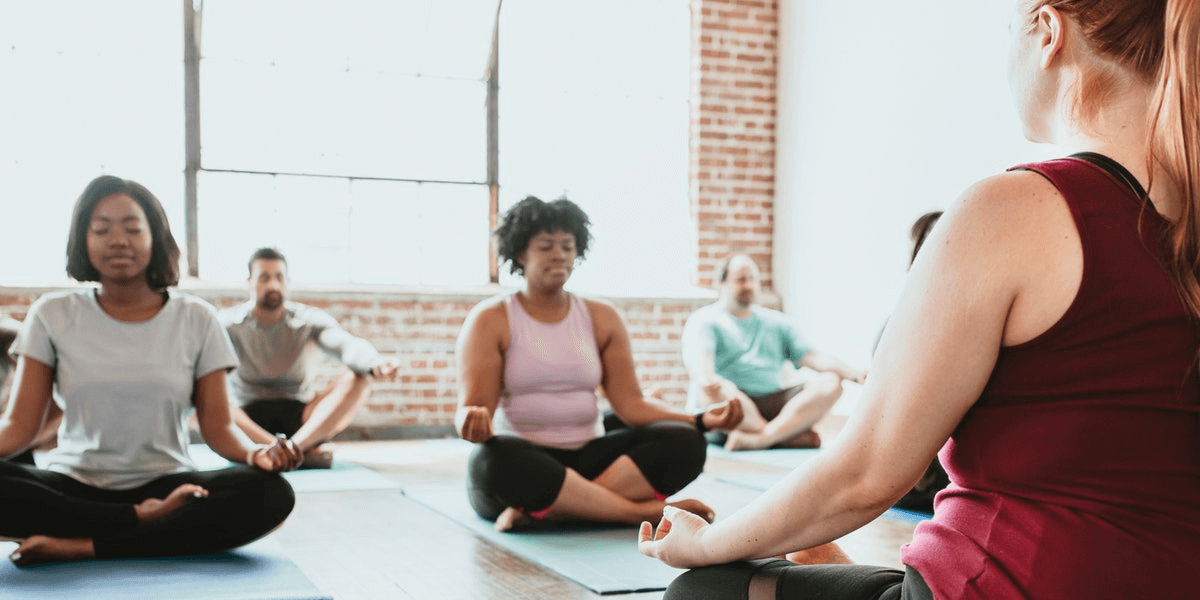

Identifying and manipulating your set point
Are you at your set point right now?
That’s a very good question which unfortunately is not that easy to answer. How much fat protection your body requires (your set point) is the result of a complex interplay of genetics and the lifestyle choices you made today as well as in the past.
You see, at this time, we do not have a tool that will allow us to determine an individual set point. We also don’t have the knowledge on how to manipulate someone’s set point either. As of today, the complexity of the human body and the number of elements involved in managing one’s set point exceed our scientific capacity.
So to be clear, if you see a headline claiming to have the secret trick to lower your set point, like the 21-day set point reset detox, which I just saw recently, that’s 100% diet culture in action. It’s a lie! Don’t buy into it because it’s a scam. It’s just another gimmick from someone who wants to make money from your despair about your body weight.
What we do know is that if we want our body to settle at a natural weight that is effortless and healthy, we must make our brain feel safe. When the brain feels safe, it will send messages to the body that it’s safe. Will you lose weight? We do not know. No one actually knows. But what we know is that health arises or is maintained in a safe physical and psychological environment.
Why dieting is not the answer
When you go on a diet or when you exercise, you create an unsafe condition for your body.
The human body perceives intentional weight loss as a threat. That’s the reason diets don’t work. Your body will adapt to the starvation/deprivation period while you’re dieting and trying to lose weight.
But as soon as you release the pressure of the unsafe condition (i.e. you stop dieting or over-exercising), your body will come right back to your set point. In many cases, it will ensure complete protection from any further threat of weight loss.
So, what can we do? Based on all the current research that I’ve read, I’d like to suggest focusing on creating a relationship of trust and respect with the innate wisdom of your body. Create a safe environment, both psychologically and physically, in which you and your body can thrive in, not just survive.
The best place to get started is to educate and understand what could be perceived by your body as unsafe especially when it comes to food and body weight.
I would encourage you to get started by listening to episode 214 of the Going Beyond The Food podcast right up to the part where I recommend a tool to help you determine what could be impacting your set point.
Here’s a free checklist and resource to help you understand the set point theory and get started on your journey into a more trusting and respectful relationship with your body.
How to get started with Intuitive Eating
In all the years that I’ve been helping women as a clinical nutritionist, I’ve found that intuitive eating is the best starting point for developing a healthy relationship with food and one’s body. I’ve also made a part of my life. The women I’ve helped, as well as I, can attest that it’s positively life-changing!
I invite you to start your own intuitive eating journey and experience the same benefits that we’ve enjoyed from it. I have put together some resources that will help you get a good head start.
First, you can download my Get Started with Intuitive Eating Guide for free. It will teach you a 3-step process that will help you get started with intuitive eating right away.
Also, you can listen to the intuitive eating podcast episodes. Here, I share my best tips and interview experts who give their valuable insights on eating intuitively.
What is Diet Culture and 4 Steps to Navigate It
If you’ve been following me on social media or reading my blog, you certainly have come across the term “diet culture.” I’ve mentioned it many times before. But what is diet culture? How does it impact your life? And what should you do about it?
This article tackles this topic and teaches you how to opt-out of it. Also, I offer some resources that will help you start a new life outside of this oppressive belief system. Here’s what you’re going to learn from this blog post:
How to navigate the diet culture
Diet culture educational resources
Now, let’s begin exploring the diet culture so you can take your first steps to freedom!
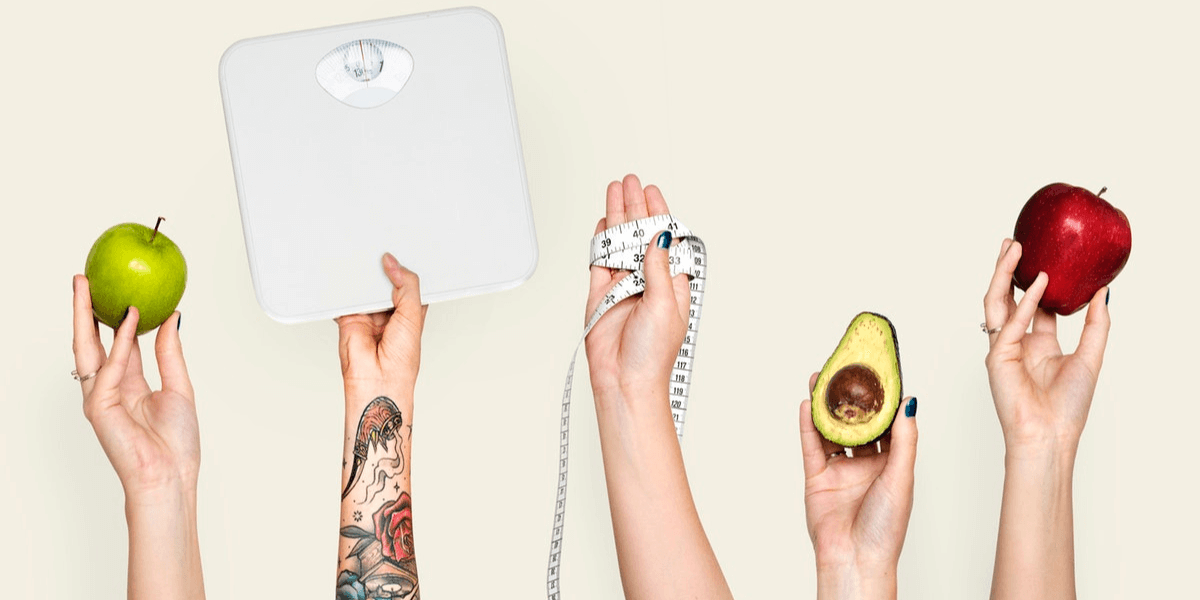

What is diet culture?
From the sound of it, you might think the term “diet culture” refers to a group of people who are on a diet. But it actually has a different meaning.
Christy Harrison, a colleague of mine, has the best diet culture definition. She defines it as a system of belief that worships thinness and equates it to health and moral virtue. It’s now prevalent in our society and oppresses women from all over the world!
How does this impact your life?
This means you may have spent your entire life thinking that you’re broken just because you don’t look like the impossibly thin ideal.
That’s just one angle. You can also look at the diet culture from three other angles:
The second angle is that it promotes weight loss as a means of attaining higher status. It makes you feel compelled, almost obligated, to spend massive amounts of time, energy, and resources, trying to shrink your body so you can fit into this thin ideal. Now, research is very clear that the dieting model has a 95 percent failure rate, so it might as well be an exercise in futility.
The next angle is it demonizes certain ways of eating while elevating others. It forces you to be hyper-vigilant about your eating, shames you for making certain food choices, and distracts you from the pleasure of eating as well as from your purpose and power.
Last but not least, it oppresses people who don’t match the supposed picture of health or the thin ideal. This affects us most particularly as women, although it’s starting to affect men.
My 25-year journey inside diet culture
As you probably know, I used to have a love-hate relationship with food and my body. A 25-year career in dieting left me obsessed, frustrated and confused about food. I was also at a loss on how to take care of my body.
Dieting was stealing my life and at 39. Then I decided that I had enough… I finally chose to take my power back and free myself from dieting and body shaming. The Going Beyond The Food Method™️ was born out of my personal journey.
Now, as a health professional, I’ve helped hundreds of women work their way out of this oppressive culture and develop a healthier relationship with food using intuitive eating and body neutrality.
Is diet culture affecting you, too? I invite you to consider its impact on your life. Take our quick self-assessment tool we created to help women determine if intuitive eating is the right solution for them.
How to navigate the diet culture
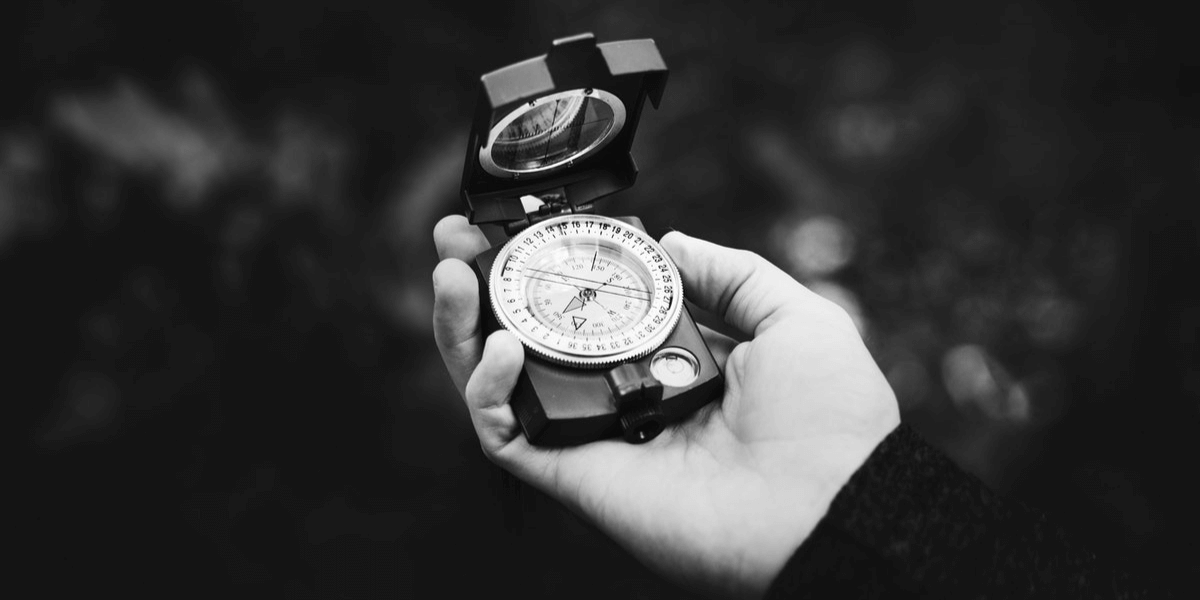

I invite you, and honestly all women, to become diet culture dropouts! Below are the four steps you need to take in your journey towards freedom:
Understand that you have a choice.
Now is the best time to be a woman. Unlike the generations before us, we’re liberated and empowered! You have to understand that diet culture is a tool that the patriarchy uses to keep us from being in our power. It keeps us busy minding our calories and macros. It induces guilt and so we feel inclined to punish ourselves when we fail.
Whether you want to stay in the diet culture and be oppressed or to break away from it and change your life, it’s totally up to you. But you should know that you have the power to make that choice.
Take responsibility.
With great power comes great responsibility. Now, that sounds like a quote from a Spiderman movie, but as an empowered woman, you are responsible for your life. No one else is!
Now, you can be the victim of diet culture and drown yourself in self-pity and helplessness. Or you can say, “Screw this! I’m going to take responsibility, and I’m going to work myself out of it and change my life.”
It’s your call.
Educate yourself.
Read books and blogs. Listen to podcasts. Consume content that supports the choice that you’ve made for yourself. Be on guard against the content that might suck you right back into the diet culture. As I’ve said before, beware of diet culture programs disguised as wellness practices.
I’ve made it my personal mission to empower women by educating them so they don’t allow themselves to be oppressed. And so, I have put together some resources for you.
We have anti-diet culture podcast episodes on the Going Beyond the Food Show, where I interview health professionals. I invite you to listen as they share their expert insights and opinions on our relationship with our bodies and with food.
You can also read our anti-diet culture blog posts on this website. Here, we go deep into the research and the studies around diet culture as well as dieting and its impact on health.
If you’re looking for an anti-diet culture book, I recommend Health At Every Size by Linda Bacon, PhD. Dr. Bacon does research around health and dieting. It’s a book that gave me a lot of “aha moments” and subsequently changed my life.
Find a framework to help you reconstruct your relationship with food and with your body.
You’re going to shift from the way of life that diet culture has taught you to a more empowering way of thinking and doing things. This means there’s a lot for you to unlearn and relearn, so you’re going to need all the support you can get.
The Going Beyond The Food Method™️ is a 5-step strategic process to help women move out of diet mentality and into self-care. Our 5 pillars are: mindset, emotional wellness, mindfulness, body neutrality and intuitive eating.
Diet culture educational resources


As a clinical nutritionist, I’ve found that intuitive eating is the most effective tool for developing a healthy relationship with food and your body. Intuitive eating teaches you to tap into your innate hunger and fullness cues. It requires you to relearn how to engage with food without restriction and without labeling food as “good” or “bad.”
The trauma around body image is more powerful than the one around food. What I have found over the years is that when we work through our relationship with food, it’s a lot easier and faster to heal body image issues.
We offer a variety of programs that will help you should you decide to opt-out of diet culture:
You can access all of our services on our work with us page. We have a number of programs and service levels enabling us to serve most women:
Free Resources and Masterclasses: Get started and get to know us better!
Private coaching with Stephanie and her team Stephanie and her team of Certified Non-Diet Coaches are waiting to support you in a one-to-one setting with an individualized plan.
Undiet Your Life group coaching program is for women to learn how to eat intuitively, become body neutral, and learn self-coaching at their own pace while being supported in a group setting by Stephanie and her team of Certified Non-Diet Coaches.
Non-Diet Coaching Certification for professionals ready to integrate the Going Beyond The Food Method™️ in their practice and for women wanting to become Certified Coach and build a business coaching other women beyond the food.
Intuitive Eating Made Simple: A Step-by-Step Guide
Intuitive eating is increasingly becoming popular among women for a number of good reasons. For one, it’s been proven to lead to positive health outcomes. Also, it’s an approach to eating that puts you in control of your eating behavior. You’re the expert of your body and the boss of you.
But how do you start eating intuitively? How do you make it work? This blog post aims to answer these questions by introducing you to the 10 key principles of intuitive eating that Evelyn Tribole developed. Here, I also show you how to get started in five easy steps. This guide is virtually intuitive eating made simple for you!
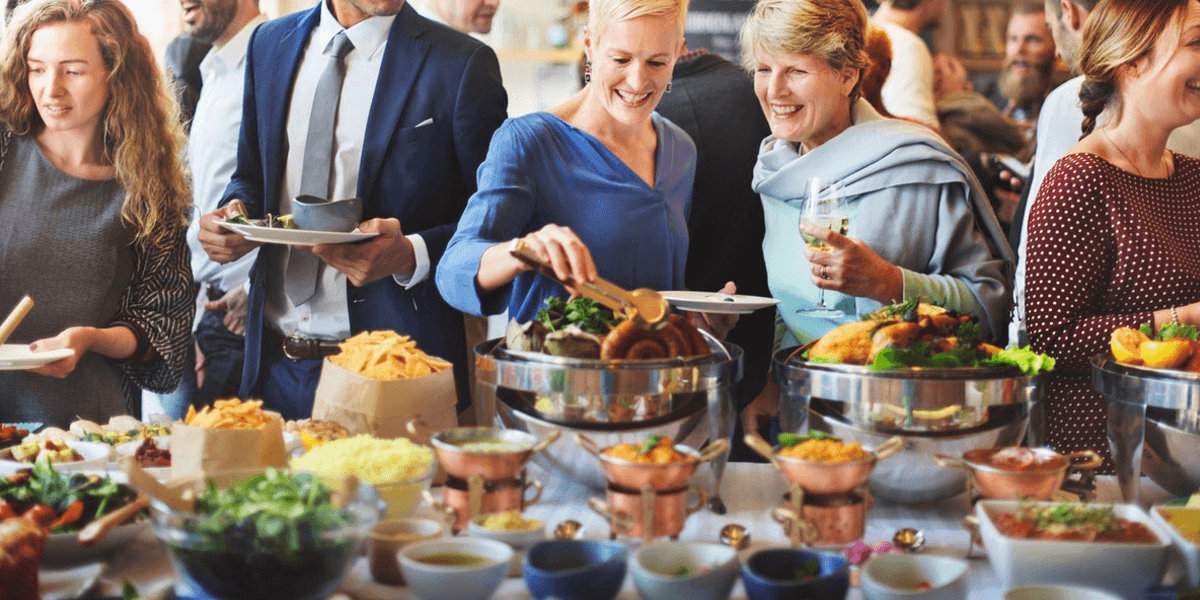

Here’s what you’ll learn from this blog post:
10 Key Principles of Intuitive Eating
Research–Based Health Benefits
Intuitive Eating and Weight Loss
What’s the difference Between Mindful Eating and Intuitive Eating?
Intuitive Eating Made Simple: How to Get Started
Intuitive Eating Free Resources
Ready to learn how to get started with intuitive eating and make it work? Let’s dive in!
What is Intuitive Eating?
When people ask me what eating intuitively means, this is the definition that usually comes to mind: “a self-care eating framework that uses your body’s internal cues of hunger, fullness, and satisfaction to guide your eating behavior.” It’s literally trusting your gut! Note that this intuitive eating definition emphasizes self-care and not weight loss.
Intuitive eating an evidence-based approach to eating that allows you to be the expert of your own body. This approach enables you to develop a healthy relationship with food and your body. It teaches you to trust your ability to meet your own needs, distinguish between physical and emotional hunger, and ultimately develop body wisdom.
Eating Intuitively is well –research and proven health framework supported by more than 100 studies as of 2019.
10 Key Principles of Intuitive Eating
So how do you make intuitive eating a part of your life? Here are the 10 key principles of intuitive eating that will guide your journey towards a natural way of eating.
1. Reject the diet mentality.
Get rid of all the diet books, articles, videos, and other materials that give you the false hope that you’ll lose weight easily, quickly, and permanently. Scoff at the lies that try to convince you that you’re a failure or something is broken in you just because another diet has failed you and you gained back the weight that you lost. Never allow yourself to be deceived again.
2. Honor your hunger.
Keep your body well-nourished and provide it with enough calories to keep it energized. Depriving your body of food can kick the drive to overeat into high gear. On the other hand, honoring your hunger lays the foundation for learning to trust your body’s messages.
3. Make peace with food.
Allow yourself to eat without any conditions. Telling yourself that you can’t eat a particular food because it’s “bad” for you will do you more harm than good. It can lead to an intense feeling of deprivation that can result in uncontrollable cravings and binge eating. And if you give into the “temptation” to eat what you think is “bad” for you, you’ll experience intense guilt. You don’t need any of that B.S.! Stop labelling food as good or bad and instead make peace with it.
4. Challenge the food police.
When a voice inside your head says you’re “good” for minding your calories or “bad because you ate some French fries, tell it to shut up! The diet culture is insidious. It deploys the food police into your psyche. Every time you allow yourself to enjoy the pleasure of eating, the police induce guilt and the fear of weight gain. It may also call you unsavory names. If you want to make eating intuitively a part of your life, you have to drive the food police away and tell it to never come back!
5. Respect your fullness.
Be aware of your body signals that tell you that you are no longer hungry. When you feel comfortably full, pause in the middle of eating and ask yourself:
- How does the food taste?
- How full are you?
6. Discover the satisfaction factor.
You’re meant to eat, not just to live, but also to enjoy the pleasure of eating. The ability to enjoy the experience of eating is a gift. Sadly, because the diet culture pressures us to fit into the thin ideal, we often forgo this wonderful gift. The truth is the pleasure of eating is a powerful force that will help you feel satisfied sooner. Thus, the more you enjoy the experience of eating, the less food it takes to satisfy you.
7. Honor your feelings without using food.
There are ways to comfort yourself and resolve your issues other than food. We all experience uncomfortable emotions throughout our lives. While food provides temporary relief, it won’t fix the underlying problems that cause uncomfortable emotions. If you eat to relieve emotional discomfort, you’ll only feel worse if you don’t deal with the source of the emotion.
8. Respect your body.
Let’s say you had a shoe size of 9. Would you waste your time wishing you could wear a size 7 shoe? It just doesn’t make sense, does it? Well, the same is true for dress sizes. It doesn’t make sense to try to fit into a size 2 dress if you weren’t born with the genetic makeup for that size! Every person has a genetically predetermined body size and shape. Stop trying to fit into the thin ideal that the diet culture worships and start respecting your body. You’re perfect just the way you are.
9. Exercise—feel the difference.
You don’t have to spend countless hours at the gym and do a particular type of workout. You can just go outside for a brisk walk or turn on your favourite dance playlist and bust some moves! Just get your body moving. And move your focus from the calorie-burning effect of exercise to how you feel while moving your body. Exercise releases endorphins, your body’s “feel-good” hormones. It also energizes you. So make feeling good your motivation to exercise rather than losing weight.
10. Honor your health.
Choose foods that support your health and please your taste buds. But remember that you don’t have to eat a perfect diet to stay healthy. What you eat consistently over time is what truly matters. Aim for progress, not perfection.
But is intuitive eating really healthy?
Research–Based Health Benefits
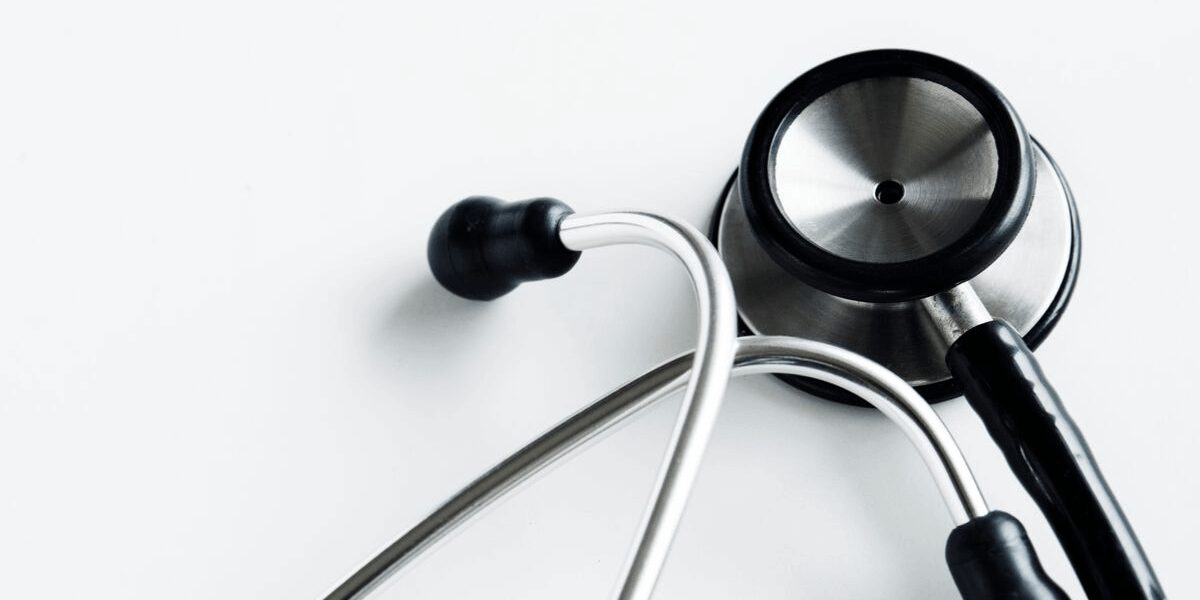

Intuitive eating is not a diet fad. It is an approach to eating that’s backed by scientific research. In 2014, an intuitive eating research study involving 1,600 middle-aged women showed strong links between eating intuitively and having a lower body mass index and positive emotional health.
I’ve written a complete guide that walks you thru all the evidence-based health benefits of intuitive eating.
- Improved cholesterol levels
- Lower stress levels
- Increased energy
- Improved mental health
- Lower eating disorder occurrence
- Improved body awareness
- Enhanced self-esteem
- Improved level of happiness
Intuitive Eating and Weight Loss
Weight loss is the be-all and end-all of all diet and exercise programs, thanks to diet culture. The end goal of eating intuitively is not weight loss, period.
Rather, it is developing a healthy relationship with food and one’s body. This healthy relationship then leads to optimum physical and mental health. In other words, when you eat intuitively, you chase health rather than weight loss.
Weight loss may be one of the many outcomes of becoming an intuitive eater as much as it may not be. Your weight may also remain stable.
Caution: If anyone attempts to sell intuitive eating as a way for you to lose weight… run the other way. Eating intuitively isn’t compatible with intentional weight loss. Losing weight intentionally will prevent you from attuning to your innate eating cues and instead keep you focused on controlling how much you eat and what food you eat.
You can read more in this article, Intuitive Eating Before and After: My Story, where I share my personal journey of becoming an intuitive eater.
What’s the difference Between Mindful Eating and Intuitive Eating?
You might be wondering if mindful eating is the same as intuitive eating. Certainly, the answer is no, they’re distinct from each other. Mindful eating is part of eating intuitively.
Mindful eating is being fully present while you eat. It’s being present in your entire eating experience on purpose.
On the other hand, intuitive eating is an entire eating framework and philosophy. It includes physical activities, how you engage with your body image, and gentle nutrition. Mindful eating is an important component of intuitive eating, which is not limited to simply being mindful.
Intuitive Eating Made Simple: How to Get Started
Eating intuitively in 5 easy steps is possible! You can start your intuitive eating journey and build a healthier relationship with food following the next steps:

Share this Image On Your Site
Step 1: Understand the diet culture and your power to choose.
The diet culture worships the thin ideal and equates thinness with good health and moral virtue. It’s prevalent in the world today. But you don’t have to be a part of it. You have a choice!
Step 2: Reject the diet culture.
Refuse to be controlled by this oppressive culture. Unfollow social media accounts that use the weight loss lingo and uphold dieting myths. Throw out the books and delete videos, apps, and e-books that support the diet culture. Beware of diet-culture programs that masquerade as wellness programs.
Step 3: Be present with your food.
Practice mindful eating. First, turn off all distractions such as your phone and the television. Then, use your five senses to enjoy the experience of eating.
Step 4: Shift from external eating cues to your body’s internal eating cues.
Stop counting calories and macros. Instead of following dieting rules, use your body’s innate hunger and fullness cues to guide your eating behavior.
Step 5: Seek satisfaction from food.
Eat foods that you like. Get attuned to your body and notice how certain foods make you feel. Eat more of those that make you feel good.
Intuitive Eating Free Resources
Want to have a better relationship with food and become healthier in the process? I’ve put together some free resources to help you begin your intuitive eating journey:
1. Is intuitive eating right for you?
2. Get Started with our free intuitive eating guide
3. Listen to our Intuitive Eating podcast episodes on the Going Beyond the Food Show.
4. Get some tips and more information from my Intuitive eating blog.
The Powerful Gift of Emotional Eating
What is the gift of emotional eating?
Thinking of emotional eating as a gift may seem to be a strange concept as the prevalent diet culture demonizes this same eating behavior. Diet culture teaches us not to give in to emotional cravings as it may be a sign that we lack willpower and discipline. Yet almost every human being eats emotionally.
One of the foundational aspects of the Going Beyond the Food Method is to see our relationship with food and our body as a message. Seeking to understand our eating behaviors instead of fighting them is what will allow us to see the gift of emotional eating. If we fail to see the gift behind emotional eating, we miss out on the guidance and opportunity for growth that it has to offer.
This article aims to help you understand emotional eating and how it can empower you instead of sending you down the path of shame and self-loathing.
It also answers these questions about emotional eating:
What is Emotional Eating versus Binge Eating versus Overeating?
What is the gift of eating emotionally?
Why do we want to stop eating emotionally?
How do we stop emotional eating?
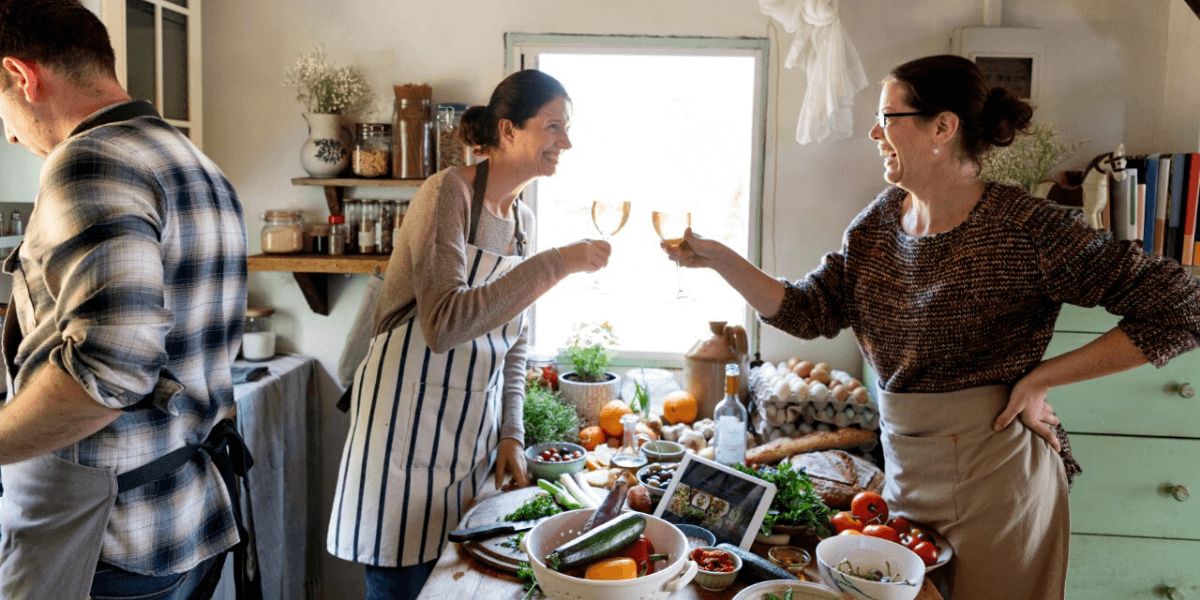

What is Emotional Eating?
Emotional eating is the act of using food to reinforce positive emotions such as joy, love, and celebration or to soothe negative feelings such as anxiety, stress, fear, anger, boredom, shame, etc.
A shorter and simpler emotional eating definition that I can give you is “eating for reasons other than satisfying one’s physical hunger.”
Most women can relate to emotional eating in some way. 99.9% percent of us are emotional eaters. Emotional eating is more common in women partly because we are more emotionally sensitive than men.
What is Emotional Eating versus Binge Eating versus Overeating?
People often describe emotional eating as mindless eating. It’s consuming food when you’re not hungry or when you’re trying to satisfy an emotional need.
On the other hand, binge eating involves eating a large amount of food within a short period of time. This eating behavior is usually accompanied by the feeling of a lack of control over the eating episode as well as intense shame about the behavior.
Binge and emotional eating aren’t necessarily two separate and distinct processes. Instead, they are one process that occurs in a continuum. What may start as casual emotional eating may lead to eating past the point of comfort (simply overeating).
How do you know when you’re moving further into the continuum of emotional eating? By paying attention to the “3-how’s”:
- How much are you eating?
- How often do you use eating as a coping strategy?
- How else are you coping with difficult emotions?
Overeating is interesting. The word clearly means “eating over a certain amount.” What is that certain amount? Who determines it?
The concept is 100% created by the diet culture. It’s a term used to shame someone who’s not following a prescribed meal plan, diet, etc.
When you ditch the diet culture and practice intuitive eating, you’ll find that there’s no such thing as overeating. That’s because you let your internal hunger and fullness cues guide you when it comes to how much you should eat instead of following a dictated amount from an external guide.
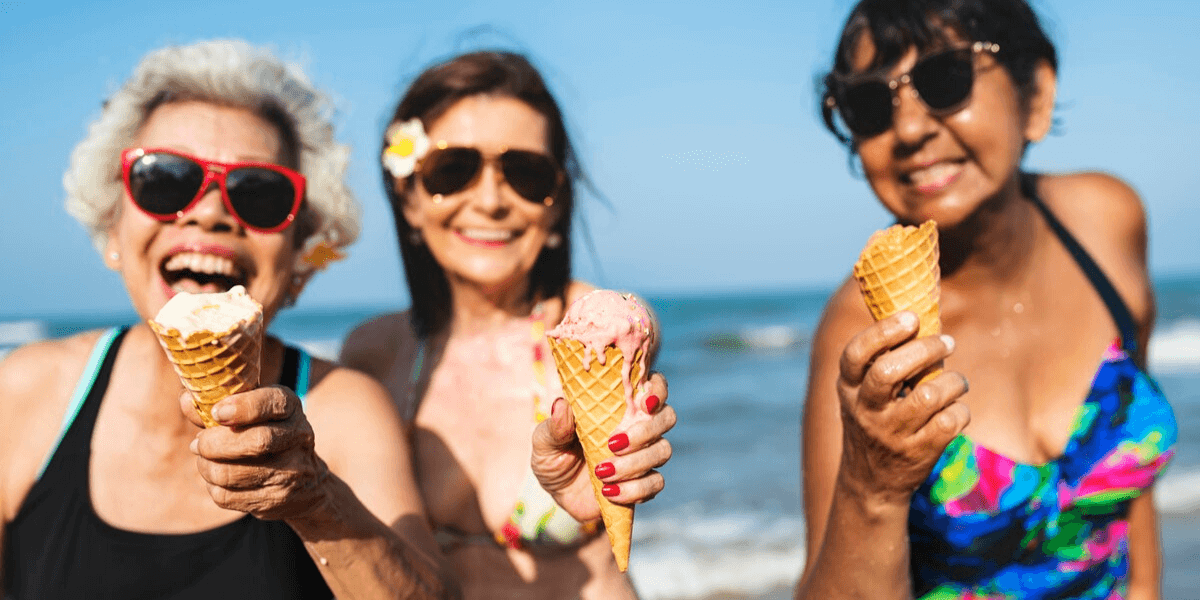

Why do we want to stop eating emotionally?
Diet culture is the primary driving force that promotes the concept that emotional eating should be first controlled and then avoided. It puts a negative spin on emotional eating as it leads people to eat more than the ideal amount it prescribes. And when you eat more than the prescribed amount, it tries to shame you and labels your behavior as “overeating.” Diet culture then provides tips and tricks to stop emotional eating as a way to ensure that you “stick to your diet”.
The second reason why people so badly want to stop emotional eating is that they don’t understand it.
Diet culture leads you to be afraid of gaining weight or not losing weight. It’s when you begin to understand that there is a gift behind emotional eating that you can finally get out of that state of fear and start engaging with your desire to eat emotionally with curiosity instead of judgment.
What is the gift of emotional eating?
Now, I’m going to get a little bit science-y here. Let’s break down emotional eating.
Let’s start by understanding what is an emotion. Emotions are created by your thoughts and communicated to the rest of your body via a burst of electric energy in your nervous system. Think of this burst of energy as a signal for the rest of your body to act or behave in a certain way. These bursts of energy are simply signals or messages that are felt in your body as sensations. You feel these sensations (aka emotions) deep down in your body both consciously and unconsciously.
Sometimes, these sensations can be uncomfortable. Emotions such as anxiety or stress are often deeply uncomfortable and food can be an antidote for this emotional discomfort. To help this emotional discomfort, food will release dopamine in our brain to offset the discomfort of stress or anxiety, making you forget for a while that you are anxious or stressed.
And so, over time, you may start building a pattern of reaching for food when you feel uncomfortable emotions. Think of this behavior as protective; you are simply trying to feel better. Humans are wired to seek comfort and pleasure and to avoid pain and discomfort.
But once you understand how your emotions relate to your eating behavior, you’ll begin to see emotional eating as a radar for your life and as a way of getting to know yourself better. Emotional eating allows you to ask powerful questions that can put you back in control and help you change your life.
The gift of emotional eating is that it’s a window into your truth and growth.


How do we stop?
Do you really want to learn how to stop emotional eating? Or do you want to understand your emotional eating behavior?
The first place to start is to shift from judging your eating behaviors to being curious about them. See emotional eating for what it is – a gift.
Ask yourself questions like:
“I wonder why I eat every night after 8 o’clock?”
“I wonder why I crave chocolate every morning around 11 am? What is that all about?”
“Why is that when I have a fight with my partner all I want is chips?”
“Why am I so afraid of gaining weight? What am I really afraid of?”
When you ask yourself questions like these, only then will you be able to start the process of understanding what is hidden behind your emotional cravings.
As the term itself suggests, emotional eating is eating in response to emotions. An emotion is a mood, a state of mind derived from our thoughts and our perspective in life. All of your emotions are the outcome of the way you think.
If you want to stop emotional eating, the best way to do that is by changing the way you think. Emotions are produced by our thoughts, therefore if we change our thoughts, we change our emotions.
To better understand how events, thoughts, and emotions influence your actions, you can listen to my self-coaching podcast episode or read my self-coaching article where I discuss how the brain works.
Seeking to understand your emotional eating behavior will help you understand yourself better. By understanding yourself and your life better, you will start making different choices and interrupting patterns that create emotional discomfort.
That’s when you stop needing to eat emotionally.


My biggest shift
For me, shifting my perspective of emotional eating has been a turning point in my life. It’s been a gift. It sent me down the path of healing. I use my relationship with food, weight, and my body as a way of seeing what’s going on in my life.
Shifting from judging my eating behavior and my body weight to being curious has been a journey. That journey wasn’t easy. I made some mistakes along the way and it led me to understand myself and why I had been struggling with food and my body since the age of 12. After dieting for 25 years, I finally understand the real reason why diets never worked for me.
It was never about the food or my body…
Need help with emotional eating?
Perhaps you came across this article because you’re looking for ways on how to overcome emotional eating. It’s mostly about understanding the gift behind it, and harnessing this gift to develop a healthier relationship with food.
We are ready to help find YOUR gift of emotional eating!
You can access all of our services on our work with us page. We have a number of programs and service levels enabling us to serve most women:
Free Resources and Masterclasses: Get started and get to know us better!
Private coaching with Stephanie and her team Stephanie and her team of Certified Non-Diet Coaches are waiting to support you in a one-to-one setting with an individualized plan.
Undiet Your Life group coaching program is for women to learn how to eat intuitively, become body neutral, and learn self-coaching at their own pace while being supported in a group setting by Stephanie and her team of Certified Non-Diet Coaches.
Women Food and Power
A short essay sharing how I claim my power back….my story to live a powerful life that I love through food and body image.
My life was pretty good: I had food on the table, a home, a car, a great career that brought in enough money, cool friends, a supportive family.
I thought of myself as an independent fierce woman.
But I also wondered, “… is that what life is really about?”
While by society standards I was doing all the right things I kept, wondering if every other woman was as anxious as I was about how I looked. Were they as overwhelmed as me at the thought of not losing or worse gaining weight? Is it normal to feel this frustrated with food and not being able to eat like everyone else?
Everyone around me reflected that it was all ok, but secretly, I knew something wasn’t right. So, I kept going making sure I was checking all the boxes:
My partner: Making sure he was happy, satisfied, that he felt loved.
The boss: I was delivering the results expected.
Social circle: Making sure I was there for them and was pleasant.
My parents: Striving to be #1, working hard and making money to ensure my safety.
Society: being a good girl and kept striving for the female beauty standards of thinness


And then the forties came along
It wasn’t one thing one moment… one day. It was a series of little things that collectively lead me to realize I was living the illusion of a happy life based on others’ beliefs.
That’s why I was eating…
I was years in the making. In fact, I was a pretty smart child and wasn’t afraid of speaking my mind. I played with boys as much as I played with girls. Certainly, a tough little girl.
But at 13, the society led me to believe that I was too much. Too tall. Too big. That if I wanted to be a good girl from now on, I needed to be less. Smaller. Thinner and also quieter. To achieve this goal of being a good little girl, food was going to be the weapon of choice. Over the next few years, I learned to diet and that shrinking my body was the gateway for me to manage my “too muchness”.
By the end of my teenage years, I learned that my power was food because I was so into diet culture. I learned that for society to accept women, she must conform to its standards. Unfortunately, I wasn’t born with a body & spirit that naturally conform to the norm so I accepted that I would need to work hard at fitting in for the rest of my life.
That’s exactly what I did for nearly 27 years until my forties came along. I started to read self-improvement books and questioning the beauty ideal imposed on women.
Women Food and Power: My journey
Up to then, my power was food (and the attempted control of weight) all to fulfill the illusion that being smaller would deliver better. I thought if I couldn’t control my height at least I could control my weight.
It turns out that controlling my weight wasn’t an easy task. It worked and then it didn’t but I learned quickly to be a “good fat person” by at least trying to lose weight and making sure everyone knew I was trying hard. That’s when I started to eat in secret.
By the time I hit my mid-twenties, I had a strong coping mechanism in place to cope with my inability to conform to what my body should look like.
- People-pleasing: I sought external validation so I made sure I wasn’t rejected
- All or nothing: On and off the diet. It’s my fault it doesn’t work so try harder
- Perfectionism: To compensate my “not enoughness” and “too muchness”, I needed to strive to achieve everything perfectly
- Mental filtering: Life is about controlling my body, therefore, my food.
That’s what I call today Diet Brain. Diet brain was the way my subconscious mind evolved to cope with the world that I felt rejected me and my body.
But something happened in my late thirties. I had this resounding secret thought “I can’t do it anymore”. I felt exhausted and the excitement of the latest diet has vanished. Soon enough, my body followed suit and wouldn’t cooperate anymore. I was anxious, depressed, and sick.
I couldn’t imagine that the rest of my life was going to be just another “diet”. Is that what life was about? Really just managing my weight?
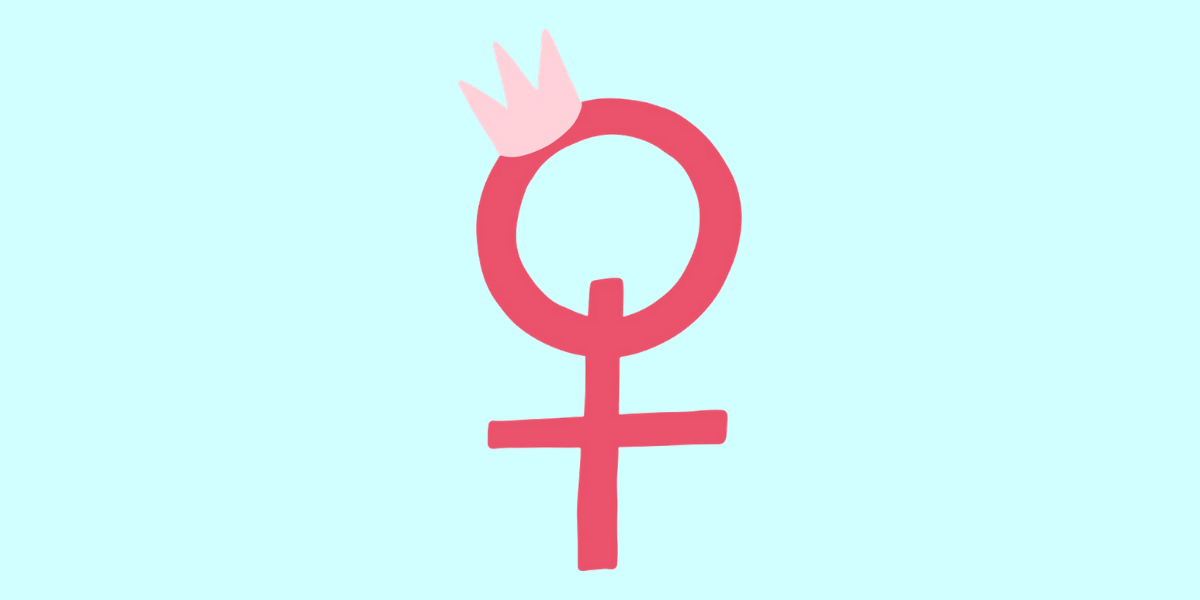

I was born worthy
The truth was that my life focus had been on chasing my self-worth. I was failing at the task but always trying and I was failing because self-worth was never going to come from being smaller.
I was born worthy but somewhere along the line of my life, someone or something led me to believe that I needed to earn my worth through my body size.
Although I had chased my self-worth for over 27 years through my body size and had yet to find it, I never questioned this belief. The indoctrination from diet culture early on in my life was still creating my reality today at 40. That’s the magic of the subconscious mind.
That is until I started to question my beliefs. Could I be enough without being in a smaller body? Is it possible to be loved and supported without being smaller? Could I be successful without being quieter?
I always had a choice
Yes: It was a possibility. I could be loved, supported, and accepted at any size.
I started to notice women in my life that were “enough” without being smaller. Women who were successful, happy, and confident in non-conforming bodies. Women whose power wasn’t wrapped around food. New people came into my life reinforcing the possibility. Books, blogs, videos… over months I had plenty of evidence.
Yet I was still stuck. I had made different choices. By then I knew it wasn’t my fault that I was the way I was but it was my fault if I stayed like that.
I needed to go from wanting to change to deciding to change. The problem was I was afraid. Scared of the perceived work it takes to change. I didn’t have time. I didn’t have the resources…
The pain of doing the work appeared to be greater than the pain of staying in the “not enough”. So, I chose to stay put. I kept lurking on what was possible.
I had so many stories in my head that keep me from not making the choice to change. Let’s face it, when it came to my ability to change my subconscious mind was telling me: “You are a failure” or “ You’ll never be able to do it” or “Why would this be any different than your attempt to manage your weight?”.
My subconscious mind was on a mission to keep me safe and secure in my comfort zone. Not believing in myself was my comfort zone. I wasn’t worthy enough to believe in myself.
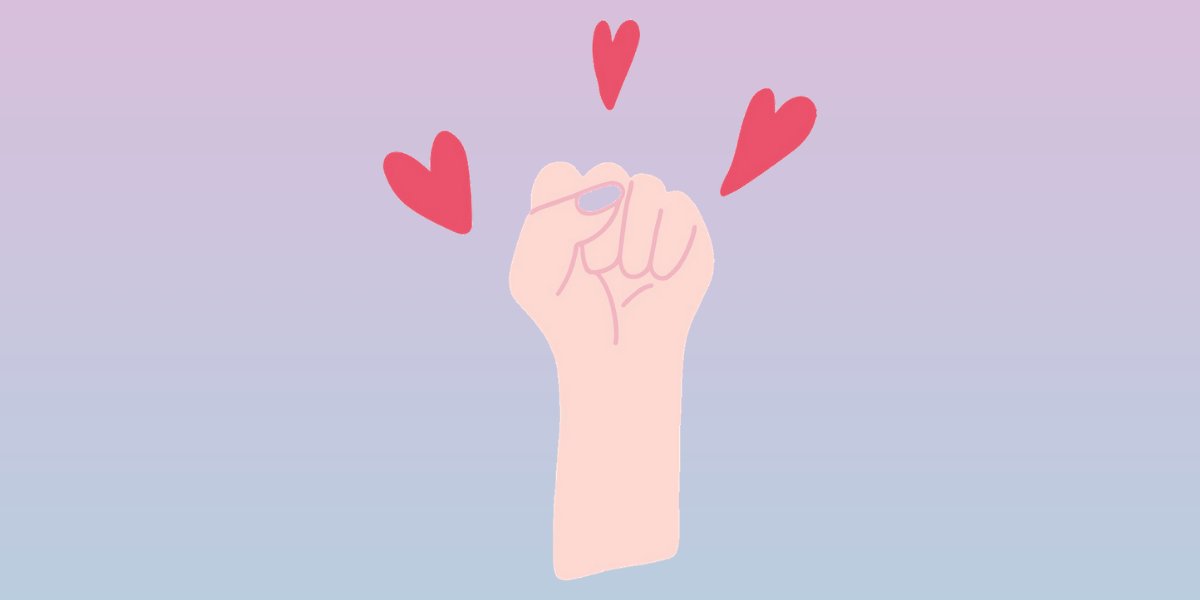

What if you couldn’t fail?
I believe in paying to be held at a higher standard that I can conceive for myself. So, I committed myself to have someone show me the way.
The greatest achievements I had in my life up to this point came from being taught by a great teacher or coach: sport, business, and adulting. I knew that if I was going to make it happen it was not going to be on my own…
“What if you couldn’t fail, Stephanie?” she asked.
In every other part of my life, failure was not an issue… would have learned from my mistake and tried again. Likely tried something different but nevertheless, failure wasn’t fear.
Why wasn’t it different from food and weight? I don’t have the answer just yet but it was. I think it’s because I had so many traumatic experiences in that sphere of my life that fear of failure paralyzed me.
“You are wildly capable, Stephanie. Look at yourself, you have dieted for 25 years, starving yourself, depriving yourself, overworking your physical body… you’ve done it all! You are so capable to do the work and make peace with food & your body so you can reconnect with your innate power!”
So, I got over myself and went for it.
Women Food and Power: The tools I found
I learned to think thoughts that actually made me feel good and learn tools to release thoughts that didn’t serve me. I learned to manage my emotions, process them productively instead of being overwhelmed by them. I now decide what stories play in my head.
At the same time, I learned to be present in my body not to what others think of my body. I’m present in the moment in my body. I’m no longer afraid of being with myself.
I learned to interact with my body as my best friend and be neutral. My physical body no longer is the filter through which I see my life. That’s body neutrality.
Lastly, I learned that I had the power within me to feed myself. My body and I are “good enough” to be our own nutrition expert. That was a turning point for me… through intuitive eating, I shifted the relationship of power with food.
Food was no longer about being less… food was about being ME.
That was the work and I did it.
Empowering yourself
How you engage with food is how you engage with your life. If you feel powerless around food you feel powerless with your life.
How you think about our body is how you think about yourself. When you hate your body, you hate yourself.
There’s a basic formula for life: Our thoughts create the way we feel, our feelings drive the action we choose to take, our actions forge our results, therefore, our thoughts become our reality.
If right now you think you aren’t good and/or worthy enough to have what other women have, that’s exactly the reality you’ll keep creating for yourself.
The most effective way to feel disempowered is to give your power of choice to something else, someone else than you. That’s what millions of us, women do when we decide to buy into the beauty ideal consequently, diet culture. The path of less resistance is to conform not to question.
Being empowered is recognizing that you do have the power to affect your life. It’s simply recognizing that you have the power to choose.
On the other side of fear is freedom.
“And the day came when the risk to remain tight in a bud was more painful than the risk it took to blossom.” -Anais Nin
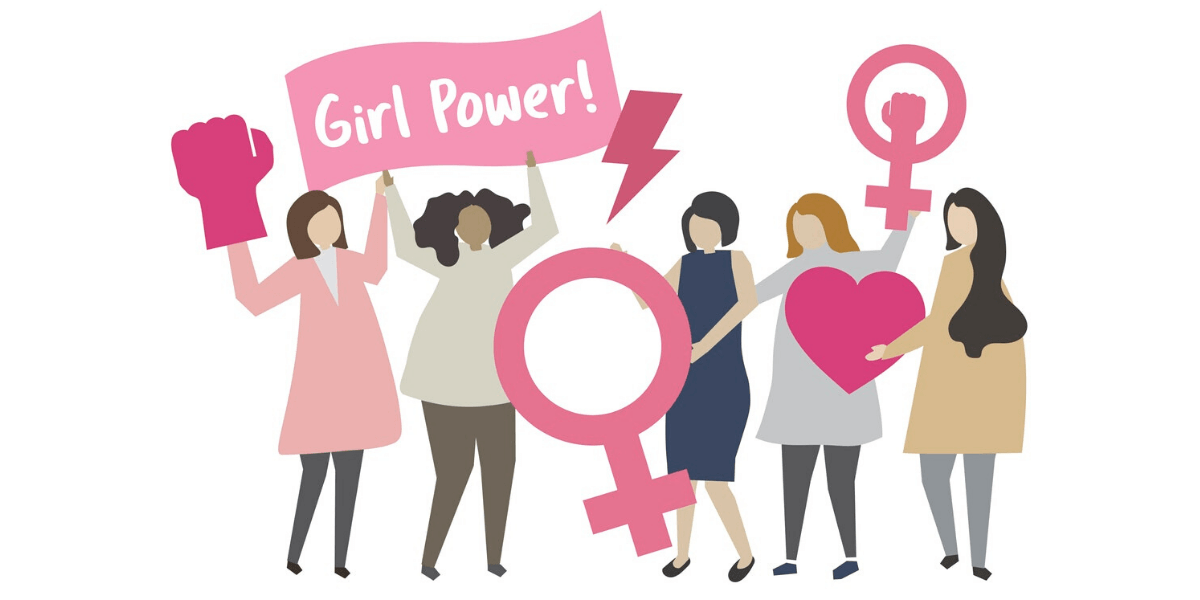

Let’s do it together
You can access all of our services on our work with us page. We have a number of programs and service levels enabling us to serve most women:
Free Resources and Masterclasses: Get started and get to know us better!
Private coaching with Stephanie and her team Stephanie and her team of Certified Non-Diet Coaches are waiting to support you in a one-to-one setting with an individualized plan.
Undiet Your Life group coaching program is for women to learn how to eat intuitively, become body neutral, and learn self-coaching at their own pace while being supported in a group setting by Stephanie and her team of Certified Non-Diet Coaches.
Non-Diet Coaching Certification for professionals ready to integrate the Going Beyond The Food Method™️ in their practice and for women wanting to become Certified Coach and build a business coaching other women beyond the food.
Good Money Business Mastermind A business mentorship and a collective of ambitious, driven and empowered anti-diet culture providers and coaches on a mission to dismantle diet culture and make GOOD money doing it!
“… But I need to lose weight”
Me: “… but I need to lose weight”.
Her: “Ok… I can see how you can think that.”
Me: “Everything you are sharing with me makes so much sense and I can feel it inside of me, that it’s what I need [pause & sigh]… but I need to lose weight”.
The tears started to roll off my cheeks. Uncontrollably crying. The tears were coming from the depth of my gut. It was one of those moments when you want to stop crying because you really don’t want to cry in front of strangers but you can’t… it’s not in your control.
Her: “Stephanie, your desires to lose weight are valid. It’s normal that you want to lose weight. The society in which we live, an environment that is full of weight stigma, body size discrimination, and fatphobia encourages these desires every day. It makes perfect sense that you want to lose weight.”
I was deeply confused.
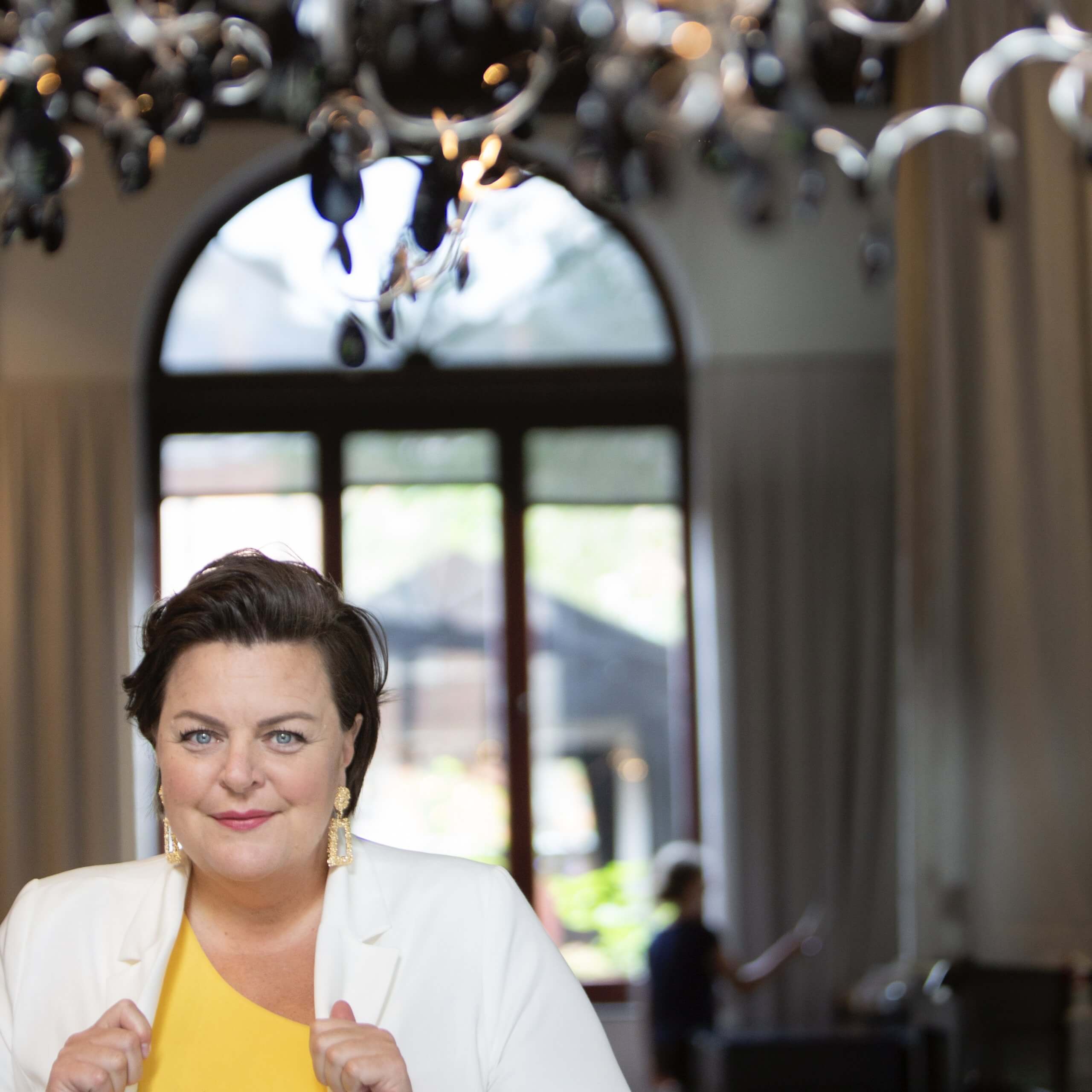

But I need to lose weight…
I was 38 years old and the last 25 years of my personal life had been a series of pressing “pause” and “play”. I only allowed myself to “play” my personal life when I was at a weight that others recognized to be ok. If I was gaining weight or not working hard to lose the “abnormal excess weight”, my personal life was on “pause”.
Her: “So, let’s work through this, Stephanie. Why do you want to lose weight? What do you feel will happen when you lose weight?”
Me: “ Uhhh….. “
No one ever asked me this question. I never asked myself this question either. My brain was stumped… blank.
Her: “It’s normal that you don’t know how to answer this question. You likely never thought of the desire to lose weight as optional therefore never considered why you desired it.”
She was right. At that point, it had been 27 years. Since my teens, I had lived on and off diets always chasing “another body”. My happiness was conditional to the way my body looked. Even when my body looked “ok”, it was such a battle to keep it up that I didn’t have the mental space or time to fully enjoy my now “allowed happy life”.
Me: “I guess you’re right...”
Her: “Until we see each other again, I want you to ask yourself these questions: Where is the desire to lose weight coming from? What do you feel will happen if you lose weight? Will you be treated differently? Will you feel beautiful? Worthy? Healthy? “
As a good perfectionist, I did my homework.
I had so many Ah Ah moments… so many realizations. It took me a while to fully accept what these questions forced me to see: As a strong, independent & feminist woman, I had given away my power.
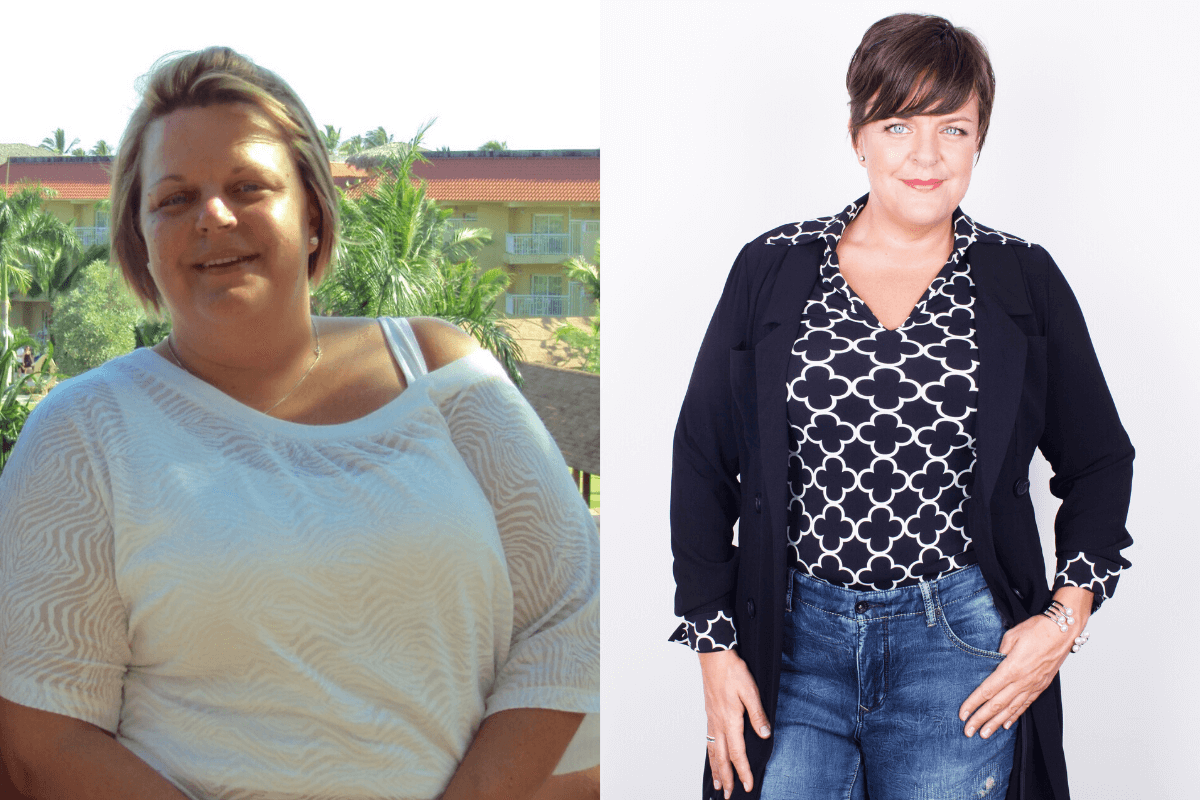

The last time I lost weight: 2008 Stephanie and 2010 Stephanie
My power was in my body size
The way others view my body affected my capacity to be myself. My power was in my body… size. Over time, I had acquired a deep sense that “I wasn’t good enough” so nearly everything I did was serving the purpose of proving to the world that I was enough even though my body wasn’t.
It was hard to prove my worth all the time. I had to strive for perfection, be sure to make choices that would appease and please others around me not to give them another reason to reject me beyond my body.
I was working so hard that my health had collapsed 2 years earlier. It was the time that I was trying to feel better, be healthier but nothing was working, not even… weight loss. I had spent a lot of $$$$ with many health professionals trying to “find and fix” my weight loss resistance without success. My body didn’t want to collaborate anymore… no matter how hard I worked: nothing.
Love versus fear
“Maybe it’s time for another approach…” That’s what my very expensive functional medicine doctor told me after doing all the tests and protocols possible. She said to me, “Maybe there’s nothing wrong with your body… what if you try to love it?”.
To be honest, I was pissed when she said this. I invested a lot on her. “Loving my body? WTF… that’s not a solution.” It took me time to accept these words and gave it a try. But I did.
By now, you might have guessed HER was a professional I was seeing to teach me how to “love my body”. When I sat and reflected on the questions, she had left me with after our first appointment, I realized that I was living in fear.
Fear of not being good enough, being rejected, not being loved, not being promoted at work, not being healthy and live a long life, …. I was powerless in the face of my body.
The journey back to my power
The hard truth was that patriarchal social conditioning had kept me very busy dieting and chasing after the false currency of beauty instead of chasing my dreams. Diet Culture taught me how being consumed by the fear of my body not being “thin’ enough was the way to be a woman… and that indoctrination kept me quiet, and most importantly, conform to patriarchy.
For 27 years, I had fully embraced the lie that my power as a woman was in the looks of my physical body. That lie was the real reason why I was struggling, anxious, and secretly depressed.
Her: “So now you are ready to do the work, sister?”
Me: “ F*ck yesss… let’s do this!”.
The journey to Undiet My Life


The first layover was to unlearn diet culture and patriarchal thoughts & beliefs that had lead me to dieting for 25 years! All that societal conditioning was showing up in my negative self-talk. What I now call Diet Brain had to be reprogrammed.
From there, I was able to conquer my beliefs around food and let my innate power guide my food choices instead of some “weight loss guru” tell me what my body needed. My body and I are smart enough to know what to eat.
The most powerful part of the journey was becoming emotionally intelligent. I had to shift from being the victim of my emotions to using my emotions as a source of information to make the best possible choice for ME. That’s how anxiety and depression left and confidence and compassion came into my life.
That led me to thrive in my relationship with my body. What I sought in my life was no longer the outcome of my body’s look… that gave me freedom. I could care for myself unconditionally and beyond dieting which is the key to bringing back my health.
I now have a relationship of trust and respect with my body. My female body wisdom is my power. I love myself, care for myself, and I thrive in my relationship with myself.
I found my power. The power to live my life now. I gave myself the permission to be enough unconditionally to what my body looks like or weight.
That’s my true power.
Are you ready to do YOUR work? If so I’d love to be your guide and support
Stephanie
Health Beyond Dieting: Chasing Health With Intuitive Eating
Health beyond dieting seems to be a foreign concept to most people.
Diet culture conditioned us to believe that thinner is better in all aspects of life including our health. We’ve always heard that thin equals healthy, and that dieting is the way to a thinner body.
We’ve also been brainwashed into thinking that a thinner body is more attractive because it is associated with health.
This is a belief that’s hard to let go.
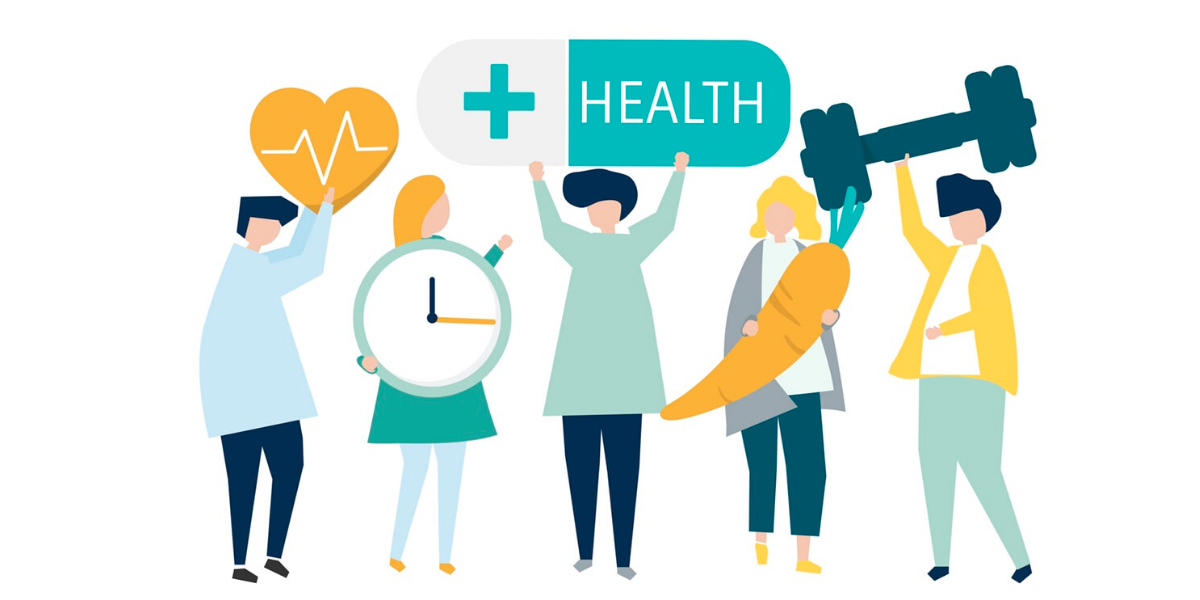

Why It’s Hard to Change Your Beliefs About Weight and Health
Your reptilian brain is the reason why it’s not easy to let go of beliefs. It’s the most primal part of your brain that has the survival instinct. It seeks to protect you from danger. Because the diet culture has programmed your reptilian brain into believing that fat people aren’t healthy, you’ve since associated health with thinness.
But as you’ll see, there is evidence that proves that your body size has little do with your health outcome. That said, it’s going to require some effort to reprogram your reptilian brain to fully accept the belief about health beyond dieting.
In this article, you’ll find answers to the following questions regarding health beyond dieting and the Going Beyond The Food Method:
- Who is the ideal candidate for The Going Beyond The Food Method™️ Health approach?
- How to get started with a weight-neutral approach to health
What does it mean to be healthy?
We all grew up with the idea that health is the absence of illness. But the World Health Organization has a definition of health that’s different from what we’re all used to. WHO defines health as “a complete state of physical, emotional and social well-being, not merely the absence of disease or infirmity.”
Good health is essential to being able to handle stress and live a long and active life. It doesn’t just refer to the absence of disease, but also to the ability to recover from illness, to adapt to life challenges in general.
When you’re healthy, it doesn’t mean you’re never sick. Humans have the innate capacity to adapt and recover from sickness and health issues. That is to say, being healthy allows you to recover and bounce back quickly.
Does “obesity” cause one to be unhealthy?
The keyword here is CAUSE. Before we can answer the question, we must first understand the difference between Correlation and Causation. For example, smoking is correlated with alcoholism, but it doesn’t cause alcoholism. However, smoking causes an increased risk of developing lung cancer.
As of 2019, there isn’t any evidence that directly points to obesity as a causative factor in a disease. That said, many studies link or correlate obesity to health risks. Even when body weight is correlated to health risks, it is never the sole factor of any health condition.
For example, research also found that obesity does not affect the risk of having coronary heart disease and stroke “Metabolic status is relatively stable despite rising BMI”. (However, it does increase the risk of developing diabetes)
But if the question is, “Is obesity associated or correlated with health risks?” the answer would be yes. If the question is “Is obesity causing disease?” the answer would be no. That’s where the big difference lies.
Here’s where it gets interesting – one-third to three-quarters of people classified as obese are actually metabolically healthy. Being metabolically healthy means having your blood pressure, cholesterol, glucose levels, and other metabolic markers within the normal range.
Is health beyond dieting possible?
Yes, and scientific research proves it!
A 2016 study by researchers at UCLA studied 40,420 adult participants in the most recent U.S. National Health and Nutrition Examination Survey. Researchers looked at the participants’ health as measured by six accepted metrics (not including BMI). These metrics are blood pressure, cholesterol, triglyceride, glucose, insulin resistance, and C-reactive protein.
The study found that 47% of people classified as overweight by BMI and 29% of those qualified as obese were healthy based on at least five of those other metrics.
Meanwhile, 31% of normal-weight people were unhealthy by two or more of the same measures.
A number of research studies show that weight loss is not necessary to improve physical health. Studies have also found that fitness is more predictive for mortality than weight. This study defined ‘fit’ as 3-4 hrs per week of walking.
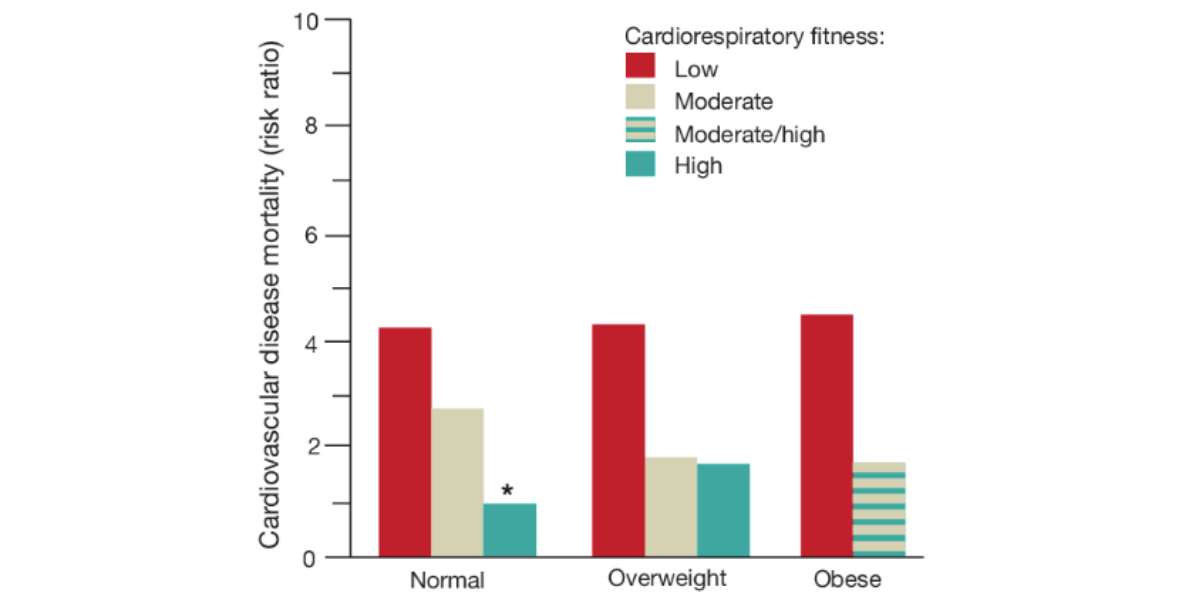

Source: JAMA. 1999 Oct 27;282(16):1547-53.
Note: “Fit” is not synonymous with “thin” or “lean.” That’s Diet Culture. Being fit means being in good health, especially because of regular physical movement.
Furthermore, trying to change your health status simply by losing weight has not only proven to be an ineffective approach but also carries potential negative side effects to your health. The focus on intentional weight loss via dieting can be harmful. Multiple studies demonstrate negative side effects of dieting behaviors. The three most documented negative effects are weight cycling, disordered eating, and weight stigma.
What is Health At Every Size?
As a response to the failure of the traditional weight-loss model of health, the Health at Every Size (HAES) movement emerged over the last decades.
Health At Every Size is a philosophy and an approach to health. Linda Bacon, PhD, an advocate for body positivity, wrote the book Health at Every Size: The Surprising Truth About Your Weight. It shows through research that health behaviors influence health more than weight.
The HAES movement promotes the simple truth that all bodies are good bodies. It shifts the focus away from dieting for weight control. Instead, it steers you toward self-care practices that support your body’s natural wisdom and vitality.
Chasing health at any size is possible. Dr. Bacon had led research to support the Health At Every Size approach to health with positive outcomes over the traditional model of intentional weight loss.
Honoring your body, and being able to understand your body’s needs, leads to meaningful changes in health behaviors.
HAES subscribes to the idea of health as stated by the World Health Organization—that it is more than just the absence of disease. It also sees health as a continuum that varies throughout one’s life span. Health, in this model, is from a holistic perspective (physical, psychological, relational, and spiritual).
In fact, the Health At Every Size approach discourages judging others and oneself regarding their health status. It acknowledges that shame and oppression can have significant negative effects on one’s health and wellness.
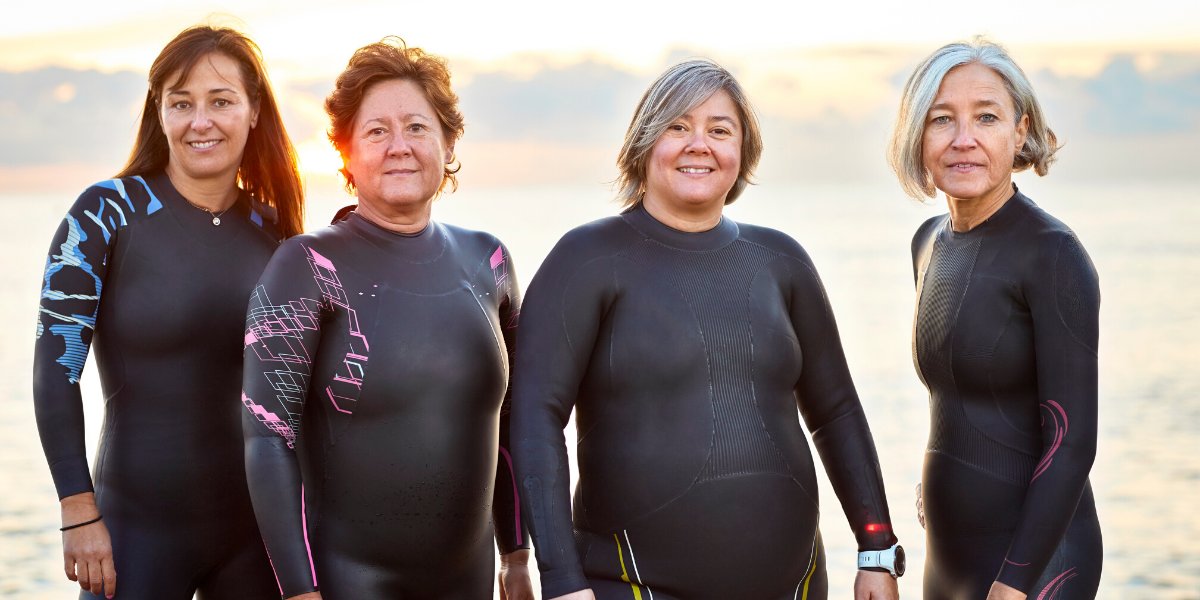

What is a weight-neutral approach to health?
A weight-neutral approach to health is based on the idea that your health status or risk level can’t be determined solely by your weight.
It acknowledges that your weight is determined by a complex set of genetic, metabolic, physiological, cultural, social, and behavioral determinants. Many of these factors are either difficult or impossible to change.
Instead of focusing on a weight-oriented outcome, weight-neutral programs teach you to take charge of the factors within your control. These factors include your thoughts and behaviors. Taking charge of these factors will help you improve your well-being, regardless of your weight.
Weight-neutral approaches to health have significantly decreased body dissatisfaction, disordered eating, and depression. They’ve also increased sustainable, enjoyable self-care behaviors such as eating and moving well in the long term.
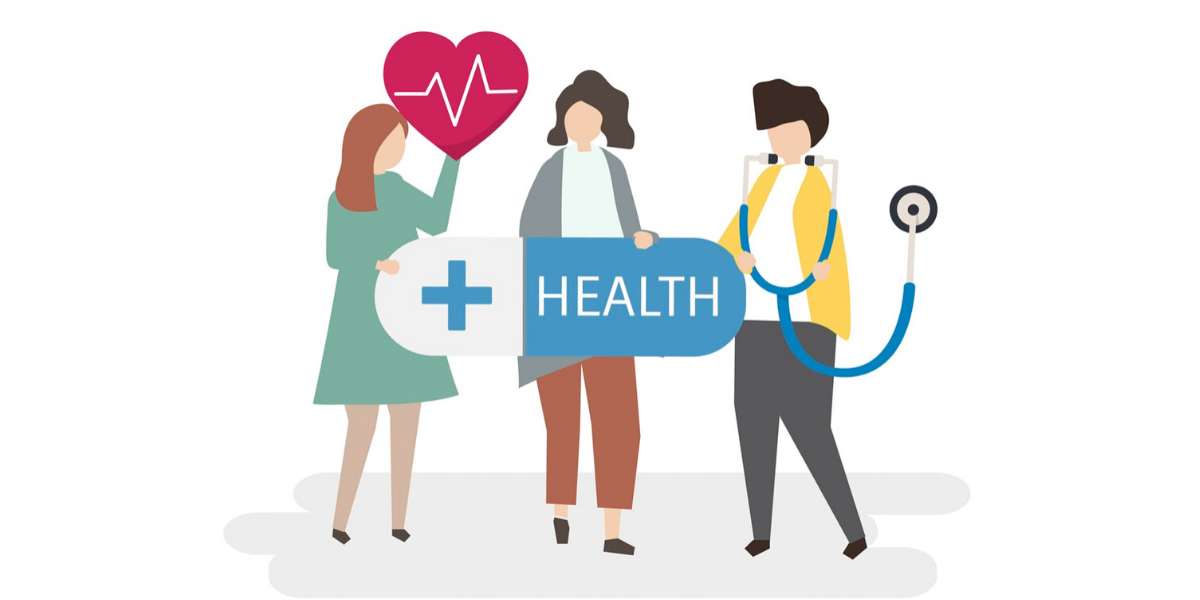

Body dissatisfaction and shame: Their effect on health behaviors
Weight stigma (also known as body shaming, or weight shaming) is the social devaluation, denigration, and discrimination of people perceived to carry extra weight based on their weight.
It originated from the “old school” model of inducing behavioral changes through punishment or shaming. A common example today is the “before and after” pictures we often see on social media.
It’s a common belief that weight stigma or shaming will motivate people who don’t meet body size ideals to change their behaviors so as to avoid further stigma.
As a result, many women internalize weight stigma and become increasingly dissatisfied with their bodies.
A 2013 study published by the Journal of Obesity found no link between body weight and the way women feel about themselves. However, the findings show a link between how women feel about themselves and their health behaviors. In other words, the better they feel about their bodies, the more likely they are to take care of themselves leading to a better health outcome.
Conversely, body dissatisfaction discourages women from taking part in certain health-related activities and from eating properly to fuel their bodies. These behaviors could eventually lead to weight gain… cynical right?
Shifting from weight management to health behaviors
Instead of focusing on weight management to improve your health, what if you shifted your focus to health behaviors?
For example, what if you cared more about the quality instead of the quantity of the food you eat?
What if you improve your mindset and thoughts so you can be better motivated to move your body every day?
What if you take steps to reduce and manage stress so that you can enjoy a better quality of sleep?
Research associated healthy lifestyle habits to a significant decrease in mortality regardless of baseline body mass index. Therefore, all BMI groups can benefit from practicing healthy habits. Interestingly, the greatest benefit is seen within the BMI “obese” group.
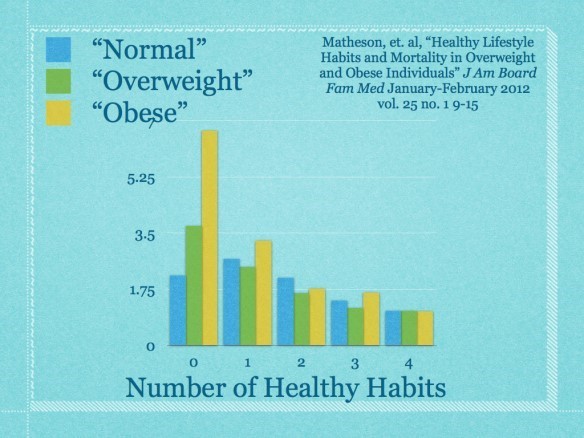

The Going Beyond The Food Method️ is a weight-neutral and non-diet health framework composed of eight core elements. Our health framework is grounded in holistic principles and functional medicine approach to health. It also follows Health at Every Size principles.
What happens if we take the Going Beyond The Food Method™️ approach to health?
The Going Beyond The Food Method is a proprietary methodology that I created. The program is primarily designed to help women make peace with food and their body. As a result, women are able to focus their efforts on health outcomes beyond dieting and weight loss. Certainly, it’s a five-step process that includes mindset, emotional regulation, mindfulness, body neutrality, and intuitive eating.
The method️ is based on four core pillars: Body Wisdom, Body Trust, Body Respect, and Body Neutrality.
The health behaviors we teach inside our programs center around intuitive eating, a well-researched self-care eating framework. Moreover, it teaches Body Neutrality, a framework that neutralizes body dissatisfaction.
Sustainability and health beyond dieting
The single most powerful advantage of a weight-neutral and non-diet approach like the Going Beyond The Food Method️ is sustainability. It helps you develop the ability to sustain health-promoting behaviors throughout your life. Our unique approach, combined with the evidence-based health benefits of intuitive eating, is very powerful!
Certainly, when it comes to health, consistency is significantly more powerful than short-term results. One of the secrets to consistency is self-compassion.
A 2015 study systematically reviewed a weight-neutral and no-diet approach to health. It determined the overall effects on factors including weight, biochemical measures, food, activity, behavior, body image, and mental health.
- Weight stability (in 5 yrs)
- Improved biochemical markers
- Cholesterol, blood sugar, blood pressure, CRP
- Sustained healthy behaviors
- Improvement in:
- Dietary quality
- Psychological states
- Disordered eating patterns
- Self-esteem
- Depression
The Going Beyond The Food Method framework supports health-promoting behaviors and makes health beyond dieting possible. It encourages the increase of fruit and vegetable intake and variety in diet. In addition, the framework aims to encourage health behaviors such as physical activity, stress management, sleep quality, and digestive health.


Who is an ideal candidate for the Going Beyond The Food Method™️ approach to health?
Truly anyone! Individuals who’ll benefit most from this approach are:
- Chronic dieters.
- Women who are overly concerned with weight and shape (a.k.a. body image issues).
- Women who are repeatedly trying to lose weight and restricting food for two years or more.
- Women who have had enough of dieting and regaining the weight that they lost.
- Women who are intuitive eaters.
- Women who have disordered eating behaviors.
If you have an eating disorder, I recommend that you work with a qualified health practitioner first. Bring yourself to safety and lay the groundwork with a health practitioner in a one-on-one setting.
Then you can come to one of our programs to learn the mindset piece of health beyond dieting.
Health beyond dieting: How to get started with a weight-neutral approach to health
You can access all of our services on our work with us page. We have a number of programs and service levels enabling us to serve most women: The #1 ressource I’d like to point you toward
Health Beyond The Scale Masterclass: Learn how to implement a weight neutral approach to health that redefine body norms and champion your body autonomy. This is the fundamental of health beyond dieting in 2 hrs masterclass!
Private coaching with Stephanie and her team Stephanie and her team of Certified Non-Diet Coaches are waiting to support you in a one-to-one setting with an individualized plan.
Non-Diet Coaching Certification for professionals ready to integrate the Going Beyond The Food Method™️ in their practice and for women wanting to become Certified Coach and build a business coaching other women beyond the food.
Intuitive Eating Before and After: My Story
I’ve always shared my journey to my followers, but only a few people know about my intuitive eating before and after story. Since I started eating intuitively, I’ve learned a lot of lessons that I’m eager to share. So I think it’s time for me to update my narrative.
If you’ve been on the fence about intuitive eating or you’ve been struggling with body image issues, these lessons will prove to be valuable to you.
But first, let me explain what intuitive eating is.


What does eating intuitively mean?
This is the most concise intuitive eating definition I can give you: “a self-care framework that uses your body’s internal cues of hunger, fullness, and satisfaction to guide your eating behavior.” It emphasizes self-care and attunement to one’s body cues.
Scientific research has proven intuitive eating to be healthy and safe. I have a blog post that describes all the intuitive eating health benefits. Read this article if you want to know how eating intuitively can help you become healthier.
As for me, eating intuitively has changed my life for the better. I’d like to share all the lessons I learned from my intuitive eating experience, hoping that they’ll inspire you to start your own intuitive eating journey.
Here is a quick rundown of the lessons I learned in my intuitive eating journey:
Lesson 1: Weight stigma is real and freakin’ powerful.
Lesson 2: Diet culture is a powerful motherfriggin’ monster but it’s optional.
Lesson 3: Repeat or evolve…It’s your choice.
Lesson 4: It’s beyond the food!
Lesson 5: The wellness diet and healthy body are BS
Lesson 6: You can’t hate yourself to happiness
Lesson 7: Intuitive eating is the gateway to health and happiness.
You can click the links or scroll down to go over the lessons and to learn about my intuitive eating before and after story in greater detail:
Lesson 1: Weight stigma is real and freakin’ powerful.
When I was 9 or 10 years old, my body was different. I was taller, heavier, and bigger than most kids in my school. My classmates bullied me…a lot. I didn’t know it yet, but I was dealing with weight stigma.
Then I grew up. The bullying became less frequent, and after some time, it stopped altogether. But there was a voice inside me, shaming me for the way I looked. For 25 years, I was brutal with myself because I thought that was the only way I could change.
I internalized the stigma that I dealt with as a kid.
Weight stigma, defined by the National Eating Disorders Association, is discrimination or stereotyping based on a person’s weight. Scientific research on weight stigma reveals that it has a huge effect on stress levels, hormones, and eating habits.
There are two types of weight stigma: externalized and internalized. Mind you, internalized weight stigma is more powerful than externalized weight stigma. Why? You can avoid the people who taunt you, but you’re with your body 24/7.
It was only when I overcame my internalized stigma that real transformation began. I became happier and more confident than ever before.
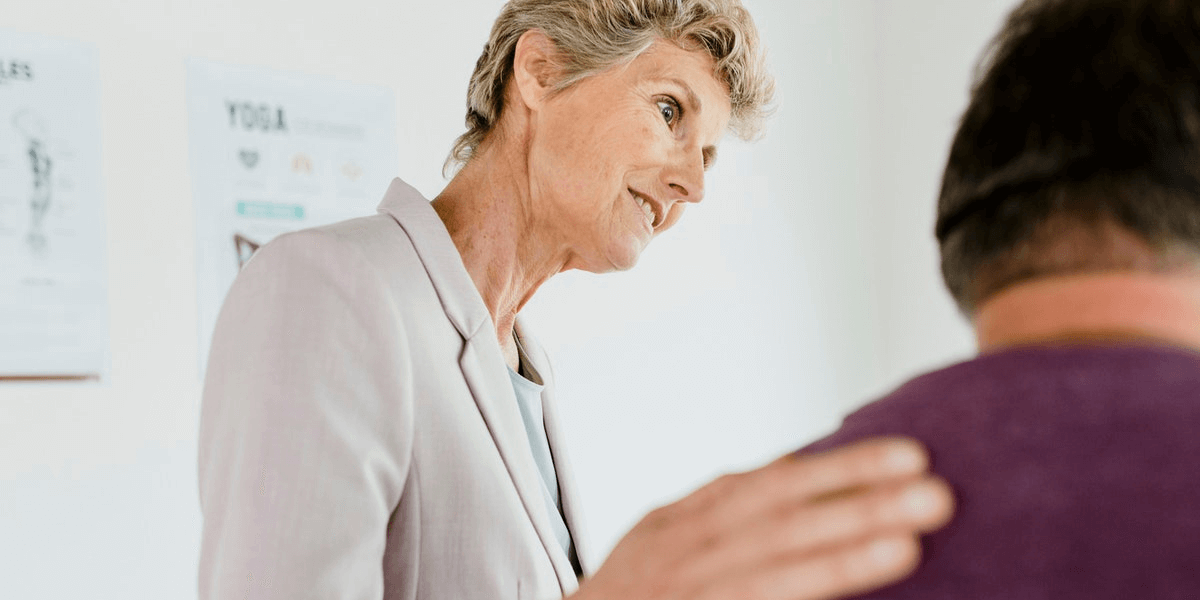

Lesson 2: Diet culture is a powerful motherfriggin’ monster but it’s optional.
The diet culture is an insidious monster that crept into my life when I was very young. It affected how I saw and treated myself. It also influenced my mother who, out of love and concern for me, sent me to Weight Watchers.
For 25 years, I was a slave to this oppressive monster. I tried one diet after another. Nothing worked. I thought there was something wrong with me and I needed to be fixed.
You might be wondering, “What the heck is diet culture?”
Diet culture is a system of belief that worships thinness and equates it with health and moral virtue. It makes you believe that you’re broken just because you don’t look like the “thin ideal.”
I had no clue that the diet culture existed. I thought that pursuing weight loss and thinness was the norm. When somebody presented me with the idea that I could actually live my life without aiming to lose weight or to become thin, it didn’t even sink in.
Fortunately, I came to realize that being part of the diet culture is a choice. Whether we want a thinner body or just lovingly accept ourselves–it’s completely up to us. The suffering that comes from wanting to be thinner is completely optional.
This led me to lesson number three…


Lesson 3: Repeat or evolve… It’s a choice.
A significant turning point in my life happened when I was in my late 30s and at the peak of my corporate career. I was about to deliver a speech before a large crowd when I suddenly collapsed. Shortly after that, I found myself in the ER.
Subsequently, the doctor diagnosed me with five chronic conditions: high blood pressure, high cholesterol, anxiety, panic disorder, and depression. The doctors prescribed a medication for each condition.
Medication was the solution that these doctors had for me. But I decided to take a different route in my pursuit of health. I took responsibility into my own hands. However, I knew that I needed support, so I hired a coach.
It was during this time that I experienced a huge shift in mindset. I stopped being a victim and began to think that life happens for me instead of to me. I realized I could choose to either repeat my actions and have the same results. Or I could change my choices and make progress. Because I had the freedom to choose, I also had to be responsible for the consequences of my choices.
If you find yourself in a situation or condition that you don’t like, remember this: You can stay wherever you are and just keep repeating your old patterns. Or you can create new patterns of behavior and evolve.
Either way, it’s your decision and you’re responsible for it.
Lesson 4: It’s beyond the food!
Geneen Roth is one of the person who taught me the emotional and spiritual aspects of food. She is the bestselling author of Women, Food, and God I had the privilege of interviewing her in one of my emotional eating podcast episodes.
I remember the time I was reading Geneen’s book, at a poolside in Florida. One concept struck me so hard that I had what I now call a “holy shit” moment.
“Holy shit! It’s beyond the food!” my brain screamed.
This realization deeply changed my relationship with food. I became aware that I was using food to numb discomfort, because I hated being uncomfortable. Using food is just one of the behavioral patterns I developed when dealing with discomfort. There were other things, too, such as people-pleasing, perfectionism, etc.
These unhealthy behavioral patterns offered me a way for me to avoid change and stay comfortable. Realizing this, I became aware that it’s really not about the food.
Lesson 5: The wellness diet and healthy body are BS
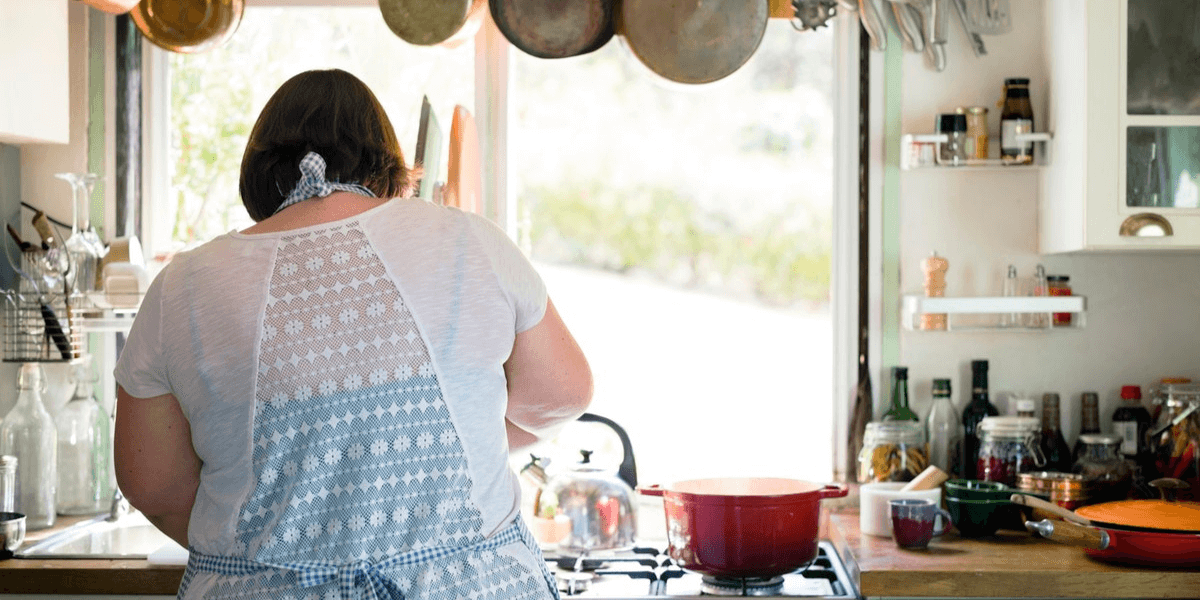

When I realized that I had to go beyond the food, I decided to stop dieting forever.
But then I learned about the paleo diet. Paleo doesn’t require you to eat less. You only have to make sure that everything you eat followed the guidelines.
I convinced myself that going on paleo wasn’t about losing weight. Instead, it was about balancing my hormones and fixing my body.
Then I encountered the Ketogenic Diet and decided to adopt it into my lifestyle.
The truth is I was still chasing weight loss, but I didn’t see that. Paleo and keto are deceptively packaged as tools for achieving health. But really, they’re products of the diet culture.
Because it was so restrictive, the keto diet sent me down the path of binge eating. My body was so angry with me for restricting food and chasing a thinner body, although I couldn’t admit it to myself.
Later, someone sent me a book called Health at Every Size. It pretty much says you can be healthy regardless of your weight. To me, it meant that everything that I was doing wasn’t going to get me where I wanted to be.
I was so offended that I couldn’t go beyond the first chapter.
It took a while before I finally accepted what it teaches. But after that, I felt a sense of freedom and relief.
I later learned that the pursuit of thinness has devastating consequences on mental and emotional health. In contrast, the Health at Every Size approach to eating emphasizes self-acceptance rather than weight loss.
Does it work? Research on Health at Every Size shows that this approach improves eating attitudes and practices, perception of body image, and health among other things.
(Read the Health at Every Size Manifesto to learn more about it.)
Lesson 6: You can’t hate yourself to happiness
After learning that I can be healthy regardless of my weight, I quit restricting food in any ways and I realized that I had to accept my body just as it is.
Now, body acceptance requires some work. This work is different from dieting. It’s not physically, emotionally, or mentally harder. It’s just different. But again, it’s uncomfortable.
I had to learn new tools to work through body acceptance–the mirror exercise, journaling, and breathing. I had to deal with the discomfort of being a beginner again. But that got me to this beautiful place of embracing body neutrality, which I now teach.
Body neutrality empowers you to embrace yourself as you are, including the parts you don’t like about yourself. Its focus is to avoid self-hate while simultaneously relieving you from the pressure of having to love your body. The goal is to respect and accept your body for what it is – and that’s it.
Lesson 7: Intuitive eating is the gateway to health and happiness.
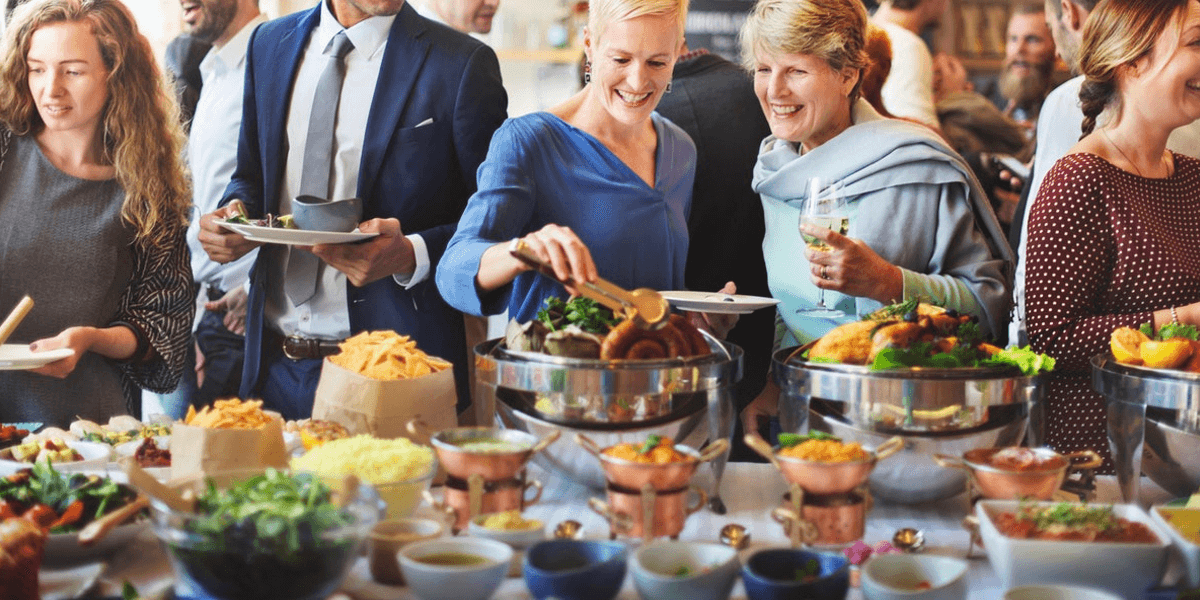

I encountered the concept of intuitive eating a few times. To be honest, at first, I wasn’t convinced that intuitive eating was any good. My colleagues sent me a book and some links to articles, but I refused to read anything about it. I simply said, “Nope, it’s not for me.”
Until Evelyn Tribole came into my life. Evelyn is one of the two coauthors of the ground-breaking book, Intuitive Eating. She is now my mentor. Through her, I learned that healing my relationship with food is necessary so I can make peace with my body.
I had the pleasure of interviewing Evelyn in my intuitive eating podcast. If you want to learn more about what she teaches about eating intuitively, listen to the episode.
Intuitive eating teaches you to respect your innate body messages such as hunger and fullness so you can have a healthy and respectful relationship with your body. This kind of relationship with my body is exactly what I’ve been enjoying since I started eating intuitively.
Wondering how to start eating intuitively?
We’re here to help! You can read my article that will walk you through the step-by-step process of integrating intuitive eating into your life.
Undiet Your Life is our beginner coaching program that will teach you how to become an intuitive eater,not just develop a healthy relationship with food, but also to embrace your current body. Go check us out.
Lessons learned from intuitive eating
Lesson 1: Weight stigma is real and freakin’ powerful.
Lesson 2: Diet culture is a powerful motherfriggin’ monster but it’s optional.
Lesson 3: Repeat or evolve…It’s your choice.
Lesson 4: It’s beyond the food!
Lesson 5: The wellness diet and healthy body are BS
Lesson 6: You can’t hate yourself to happiness
Lesson 7: Intuitive eating is the gateway to health and happiness.
Self-Coaching for Intuitive Eating
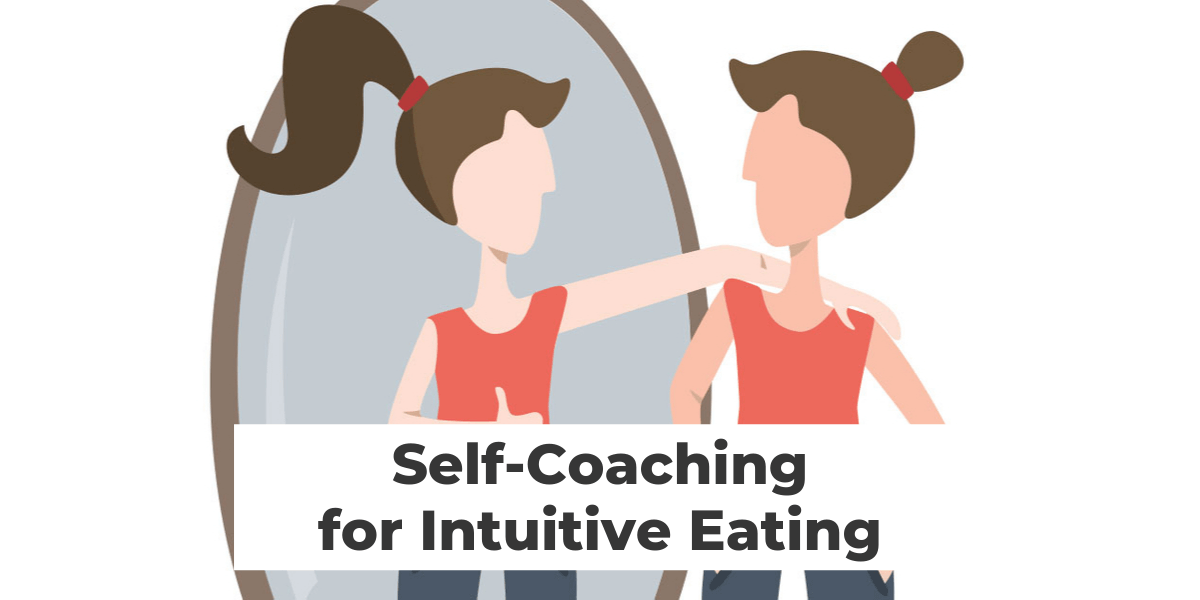

Have you ever wondered about self-coaching for intuitive eating and asked, “Can I be successful with intuitive eating on my own?”
After all, intuitive eating is meant to empower you to be the expert of your own body and make you the boss of YOU.
However, just as there are diet coaches, there are also intuitive eating coaches. But do you need them? And what’s self-coaching anyway? If you are your own coach, does that mean you don’t need a coach at all?
These are the questions that I aim to answer in this article. I also hope to help you understand what coaching is, especially in relation to self-coaching. Last but not least, I want to show you what the self-coaching model looks like and how it can help you change your thoughts and your behavior.
But first, let me discuss what intuitive eating is, just to make sure you understand the concept before we move on to self-coaching.
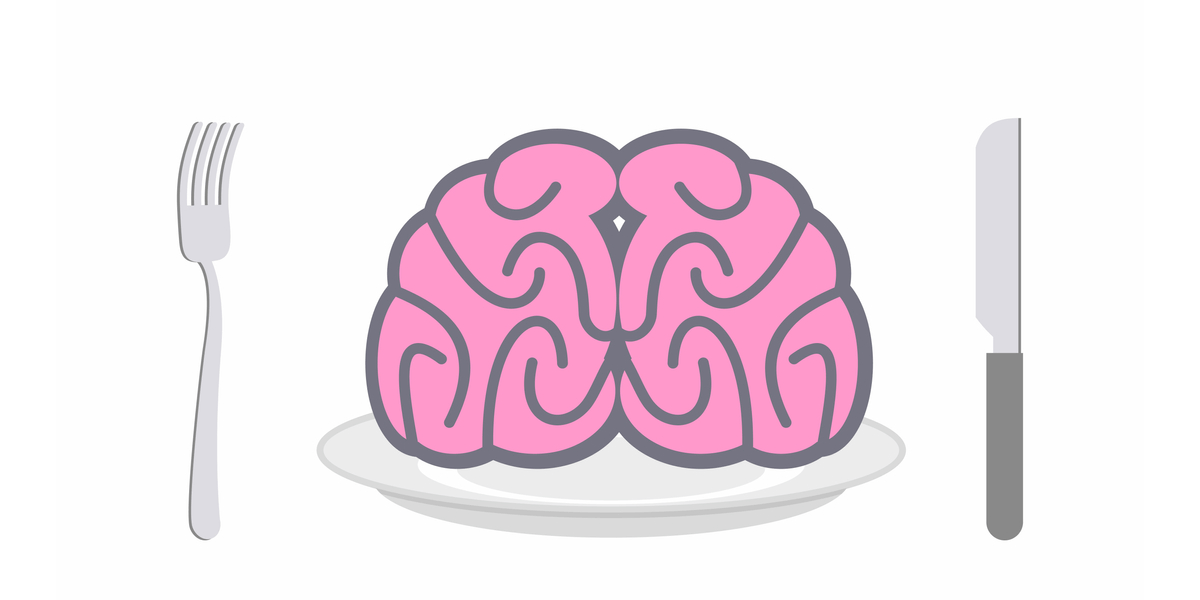

What is Intuitive Eating?
This is the intuitive eating definition I usually give whenever I’m asked about the concept: “A self-care framework that uses your body’s internal cues of hunger, fullness, and satisfaction to guide your eating behavior.”
Eating intuitively teaches you to trust your own ability to meet your own needs. It’s an empowering alternative to dieting. It requires you to be attuned to your body’s cues.
You can learn more about eating intuitively by listening to my intuitive eating podcast episodes.
Now, let’s explore self-coaching.
What is Self-Coaching?
Coaching is identified as the process of supporting a person towards a goal. It’s a form of development that leads people from where they are to where they want to be.
Typically, in a coaching relationship, there’s a coach, who does the coaching, and a coachee, who is the learner or the client.
Self-coaching is when you become your own coach. You are both the coach and the coachee. The idea may sound a little strange to you, but yes, you can coach yourself. You have an innate wisdom that knows what’s best for you and enables you to become the expert of your own life.
Coaching Versus Training: What’s the Difference?
Some people use the terms “coaching” and “training” interchangeably, but actually, they’re two different things. Training is focused on learning and acquiring knowledge. It’s usually formal.
On the other hand, coaching is focused on developing the skill set to apply the knowledge learned. It’s often informal, discussion-based, and experiential.
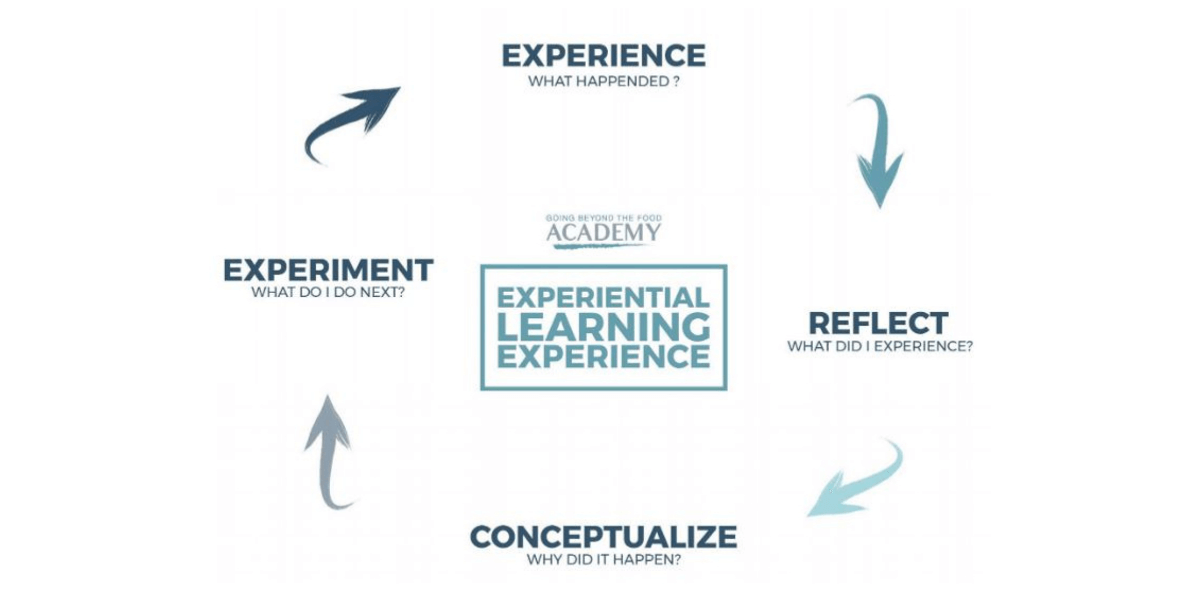

The History of Self-Coaching
The first use of the term “coach” in connection with an instructor or trainer was in the 1830’s at the Oxford University. The term is slang for a tutor who “carried” a student through an exam. In the 1860’s, the term was used in sports to refer to an athletic trainer or instructor.
With the advent of the human potential movement in the 1960’s, the term came to refer to mentors, especially in executive development in the corporate world. Today, there are coaches in different areas of life–life coach, coach for binge eating, fertility coach, etc.
Self-coaching came to the world’s awareness about 20 years ago. Dr. Joseph Luciani is the leader in the field of self-coaching. He wrote four books on the subject, including The Power of Self-Coaching. This book is a must-read for those who want to understand the science behind coaching and self-coaching.


Coaching Versus Self-Coaching
In a coaching relationship, both the coach and the coachee establish goals centered around what the coachee wants to achieve. The coachee commits to taking action towards improvement. On the other hand, the coach brings guidance, support, tools, resources, framework, and a step-by-step action plan to help the coachee achieve the goals they set together.
On the other hand, self-coaching is tapping into your innate wisdom to make the best decisions certain areas of your life. It’s the same inner wisdom that guides you when you practice intuitive eating.
Intuitive eating is the process of learning to self-coach yourself around food.
So which one is better for you—coaching or self-coaching?
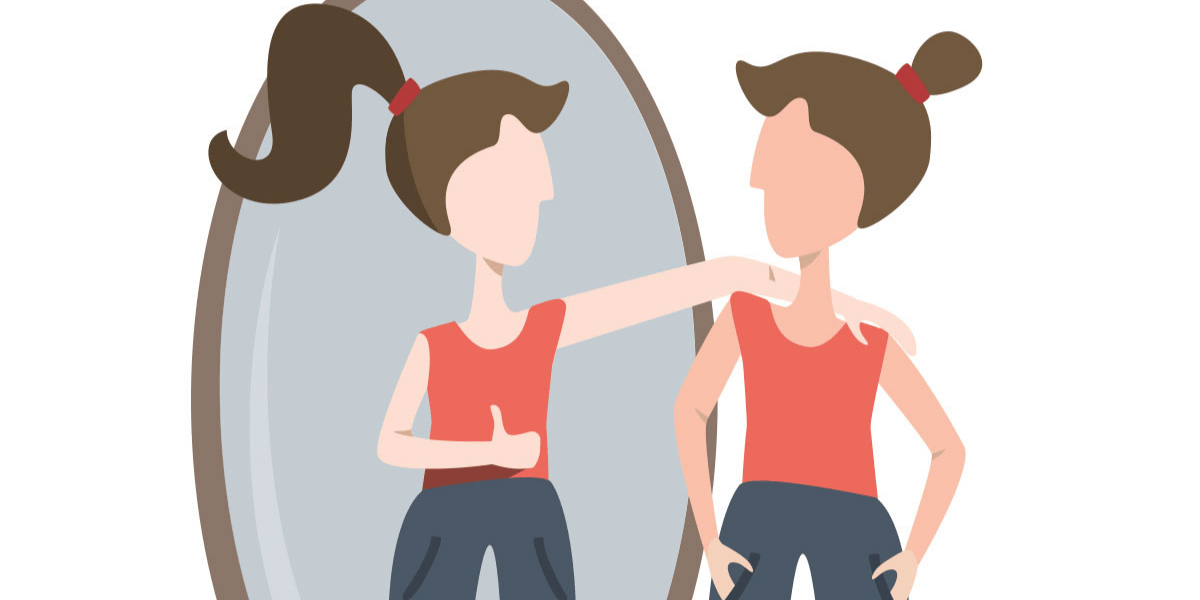

Having a coach is always better. A coach helps you build confidence and maintain momentum. You’ll know where to focus and you’ll never feel lost and overwhelmed because there’s someone guiding you.
Most importantly, a coach will help you see your blind spots, the patterns you aren’t aware of yet, so you’ll know why things haven’t worked out in your own.
But what do scientific researchers say about self-coaching?
Research on Self-Coaching
If you’re torn between self-coaching and coaching, you may want to know what scientific researchers say about the different types of coaching.
Researchers from different universities in Austria and Italy conducted a study on individual, group, and self-coaching. They found individual coaching to be the most effective type of coaching.
On the other hand, research on self-coaching reveals that it is not as effective as the other two types of coaching.
However, this doesn’t mean that self-coaching is useless or that it doesn’t work.
The best thing you can do is start with a coach who will guide your first steps towards your goal and teach you to be independent. A good coach will equip you with everything you need to learn so you can later transition to self-coaching.
How to Do Self-Coaching for Intuitive Eating
As I just said earlier, you can either hire a coach or you can do self-coaching. If you choose to strike out on your own with intuitive eating, here are the steps you need to follow. This is self-coaching 101 for intuitive eating. Follow these and you’ll get a good head start:
Step 1: Find out whether intuitive eating is right for you.
Step 2: Determine whether self-coaching works for you.
Step 3: Understand how your brain functions.
Step 4: Be aware of your thoughts.
Step 5: Pick one thought and investigate it.
Step 6: Replace the thought that is not serving you with an empowering one.
Step 7: Coach yourself by reinforcing the new thought.
These steps are discussed in greater detail in the following paragraphs. If you want to focus on a particular step, you can simply click the corresponding link above.
Step 1: Find out whether intuitive eating is right for you.
To help you with that, I have created a starter kit of self-assessment for eating, body image and mindset. Download the free non-diet assessment kit and complete the eating assessment. These are actually the same assessment I use with my private clients!
So go ahead and take the test.
Step 2: Determine whether self-coaching works for you.
In the free starter kit of Non-Diet Assessments there is a second evaluation for your mindset. Take it to determine your current mindset state and if self-coaching can be of support to you.
Step 3: Understand how your brain functions.
The self-coaching model is based on the CBT framework. CBT (cognitive behavioral therapy) is a type of psychotherapy that aims to change negative patterns of thinking and behavior. This framework gives us a window into how the brain works.
Here’s a graphic that shows the self-coaching model:
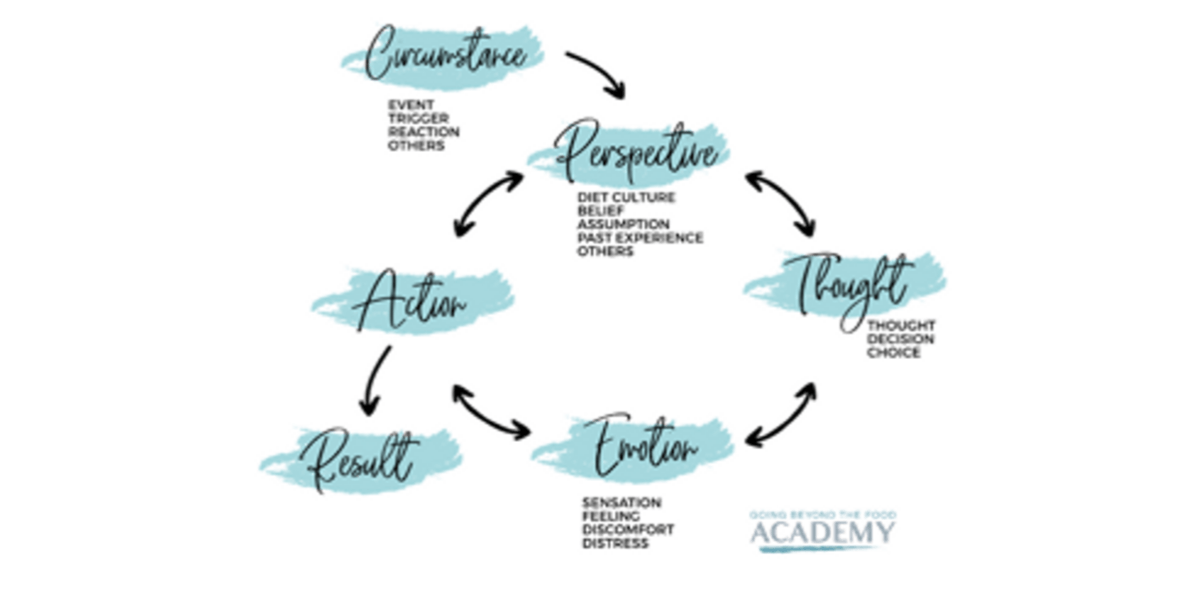

At the very top, you’ll see circumstance. This is an event that acts as a trigger, something that happens in your life that causes you to have thoughts and emotions that influence your behavior.
The image that you see goes through your brain and into a filter called perspective. Your perspective towards body image is shaped by your beliefs, assumptions, and past experiences.
After your brain goes through this filter, it creates a thought. Then, these thoughts create emotions. Your emotions influence your actions. Finally, your actions create a result.
When you understand how the brain works, you can use this to your advantage and influence the whole process to get the results you want. This is why understanding how your brain works is crucial in self-coaching.
Step 4: Be aware of your thoughts.
Kara Loewentheil, my mentor and the author of Unfuck Your Brain, once said, “Awareness precedes change.” So if you want to change your thoughts, you must first be aware of them.
Here’s an exercise that will help you become aware of the thoughts that influence your actions:
Grab a pen and a piece of paper. Write down your thoughts that you’re currently having around eating and/or body image.
Now, this is important: Write these thoughts down without judging them. Be in the “observer mode.” Just dump these thoughts onto a piece of paper as they come.
Step 5: Pick one thought and investigate it.
After writing down your thoughts, look for the one that comes up frequently (perhaps a recurring theme) or the one that’s most painful.
Take that thought and put it through the self-coaching model. What were the circumstances that trigger this thought? What emotions come up when this thought enters your mind? How does this thought influence your actions? What results do these actions create?
Investigating your thoughts will help you fully see the impact of your thoughts in your life. Some people skip this part, which is why they fail at self-coaching. They jump from being aware of a negative thought to changing the thought outright.
This step is essential. DO NOT skip it.
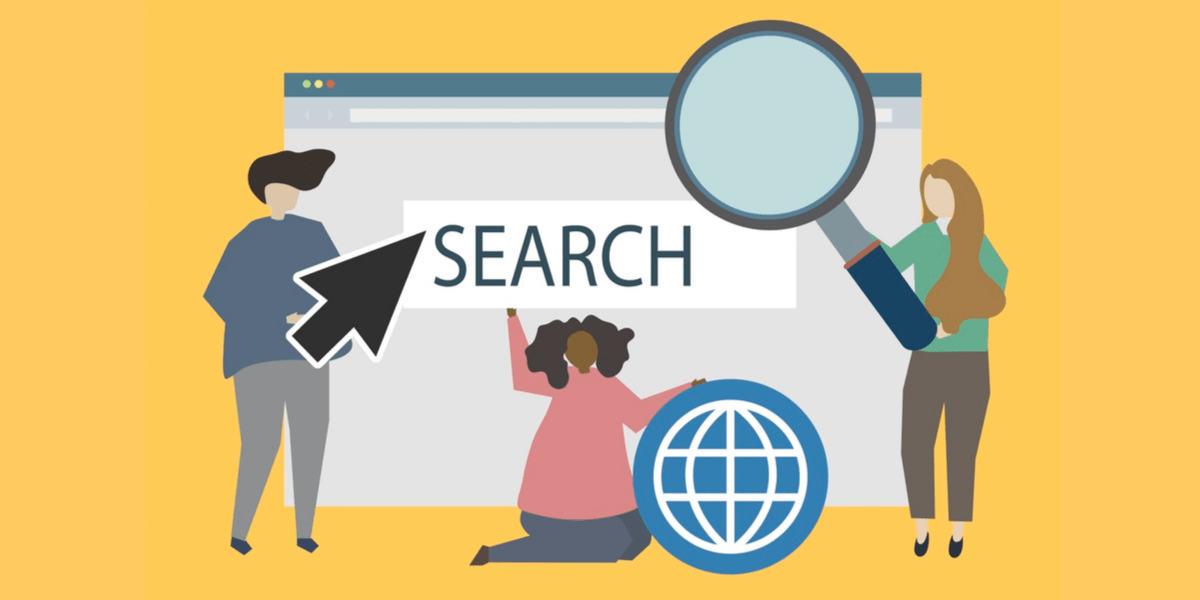

Step 6: Replace the thought that is not serving you with an empowering one.
Now that you’ve investigated the thought that has been responsible for the results that you don’t want, it’s time to replace that thought with one that empowers you.
In the previous step, you saw how your old thought led you to the results that you didn’t like by putting it through the self-coaching model. This time, you will create a new, empowering thought by applying the same model you used to investigate the old thought.
In a nutshell, this is how you do it: Create an empowering thought that generates the emotion that drives the actions needed to produce the results you want.
Step 7: Coach yourself by reinforcing the new thought.
You now know how you need to think and what you want to think. It’s your job to go and repeat that thought many times every single day. You can get creative by making a poster that reminds you of that new thought. Or you can scribble the thought on a Post-It and stick it where you’re likely to see it often.
Now, reinforcing a new thought in order to change results isn’t as easy as it sounds. It will require patience and practice. You also need to keep the motivation and momentum going, especially when you must take action. Setbacks will be inevitable, but look at them as learning opportunities rather than failures.
In the end, the benefits you reap will be well worth your patience and effort. So, keep at it!
Need support to learn self-coaching?
If you’re looking for an program to help you learn self-coaching we offer two different option: Beyond Mindset is short term program specifically focussed on teaching self-coaching.
Undiet Your Life Program is our signature intuitive eating coaching program that teaches you self-coaching techniques, along with intuitive eating and body neutrality. It also aims to equip you for self-coaching for your entire life.
Intuitive Eating: 8 Evidence-Based Health Benefits
Does intuitive eating really have health benefits?
That’s not an unusual question for people getting started with intuitive eating. The answer is a resounding YES, and its amazing health benefits are backed by science.
In fact, intuitive eating is picking up popularity, not only among former dieters but also with researchers. As of 2019, there are more than 100 research studies looking at intuitive eating. These studies demonstrate that intuitive eating has many positive health outcomes like:
- Improved cholesterol levels
- Lower stress levels
- Increased energy
- Improved mental health
- Lower eating disorder occurrence
- Improved body awareness
- Enhanced self-esteem
- Improved level of happiness
Have you been dieting for quite some time, but keep finding yourself right where you started?
Intuitive eating can help you break out of that cycle. And unlike dieting, it lets you enjoy eating without regret, guilt, or shame about your food choices.
What is Intuitive Eating?
Perhaps the best intuitive eating definition I can give you is, “a self-care framework that uses your body’s internal cues of hunger, fullness, and satisfaction to guide your eating behavior.”
This definition emphasizes self-care and implies reconnecting with the body. That is to say, you need to be attuned to your body to follow its cues.
As I discussed in my intuitive eating podcast episode of The Beyond The Food Show, eating intuitively is innate in all human beings. When you were a baby, you’d cry when you were hungry, and you’d be fed. You knew when you needed to eat. When you were full, you’d just stop feeding and go back to sleep. We just moved away from this natural state when we were immersed in the diet culture.
Does Intuitive Eating Really Work?
Yes. Hundreds of intuitive eating research studies prove that it does work. It isn’t another fad diet.
Registered Dietician Nutritionists (RDNs) in the U.S. agree. A 2017 study found that RDNs are using an intuitive eating approach more often than traditional weight management practices.
If you’re wondering “How does intuitive eating work?” you may want to read my blog post that answers that question.
Is Intuitive Eating Healthy?
Intuitive eating is both healthy and safe. It’s based on being attuned and aligned with your body’s natural hunger and fullness cues. What could be healthier than that?
But don’t take my word for it. Scientific studies do confirm the health benefits of intuitive eating. Here are a couple of examples:
A study participated by 1,600 middle-aged women links intuitive eating to lower body mass index and positive emotional health. It also showed potential benefits on nutritional and cardiovascular health.
Another study found that chronic dieters can benefit from size acceptance and intuitive eating. It also supports long-term behavioral change. Size acceptance, reducing dieting behavior, and increased awareness and response to the body’s internal cues improved health risk indicators for the study participants.
Certainly, intuitive eating is not only safe; it promotes your overall health!


What are the Benefits of Intuitive Eating?
Intuitive eating teaches you to have a healthy relationship with food by empowering you to trust your ability to meet your needs. It helps you distinguish between physical hunger and emotional hunger and ultimately develop body wisdom. This results in improved overall health.
Let’s look at the specific benefits intuitive eating has to offer:
1. Improved Cholesterol Levels
Intuitive eaters have been found to have lower triglyceride levels, higher levels of high-density lipoproteins (HDL), and lower cardiovascular risk. One of the possible reasons for the improved cardiovascular health of intuitive eaters is the improvement in the inflammation marker, C-reactive protein (CRP).
In fact, anyone can benefit from intuitive eating, including those with health challenges. Moreover, it can also help prevent certain health conditions.
2. Lower Stress Levels
In my opinion, this is the most important benefit of eating intuitively. One of the most notable transformations demonstrated in studies that look into intuitive eating is with the psychological health indicators such as better body image and lower incidence of depression and anxiety.
Ditching the diet mentality and breaking free from the cycle of “getting on and off the wagon” will tremendously reduce your stress around food.


3. Increased Energy
Intuitive eating increases your energy by creating a lot of mental space for you. By worrying less about eating, you have more headspace to focus on other priorities in your life.
Research also links intuitive eating with increased motivation to engage in regular physical activity. Women who say that they are internally motivated to eat are more likely to participate in physical activity for pleasure. Therefore, they see themselves as physically active.
In other words, when you eat intuitively, you’ll have more energy and you’ll want to move more. Ultimately, that leads to better health and greater productivity.
4. Improved Mental Health
One of the reasons why diets often fail is that they make you feel bad. Food restriction is associated with negative mood, decreased cognitive functioning, eating disorders, weight obsession, and body dissatisfaction.
On the other hand, a study published in the Cambridge University Press website reveals that there is a substantial and consistent relationship between intuitive eating and improved mental health.
If dieting has made you feel bad about yourself, eating intuitively will make you feel better. Therefore, helping you get into a better mental state.
5. Lower Eating Disorder Occurrence
Those who suffer from eating disorders either restrict food or overindulge. In contrast, intuitive eating resets and balances your eating habits.
Researchers analyzed the eating habits of 2,287 young adults. They found that the participants who followed their hunger and fullness cues were less likely to have eating disorder behaviors than those who didn’t.
Your body instinctively knows what, when, and how much you should eat. In like manner, when you eat intuitively, you trust your body’s wisdom to guide you. You can’t go wrong with that.
6. Improved Body Awareness
Your body has a way of giving subtle signals that are meant to guide you in making the best choices for your health. (We call these signals “body messages” in the Going Beyond the Food community.)
It also lets you know when you have a health problem coming up through the symptoms that you experience. This way, you can take the appropriate steps to deal with the problem before it becomes a crisis.
Intuitive eating is based on interoception-the ability to feel the small sensations in the body such as hunger, fullness, and satisfaction cues. Researchers have found that those who follow their internal eating cues are more sensitive to interoceptive signals.
This means that when you eat intuitively, you get more attuned to those body signals. This will help you with your relationship to food and will enable you to make the right decisions for your overall health.
7. Improved Self-Esteem
The diet culture promotes the “thin ideal.” It assumes that you that if you’re not thin enough and you don’t look a certain way, you’re broken. Therefore, you need to be fixed. It also equates food restriction with moral virtue. Obviously, it’s oppressive and can damage your self-esteem.
In contrast, intuitive eating results in positive body image, better body satisfaction, and improved self-esteem. A positive body image and high self-esteem motivate you to make better choices concerning your health while relying less on willpower.
Inside the Going Beyond The Food Method, we teach our students a unique approach to body image: Body Neutrality. For people who have lived through years of internalized and perhaps externalized body shame for years, body neutrality is the bridge from body hate to body positivity.
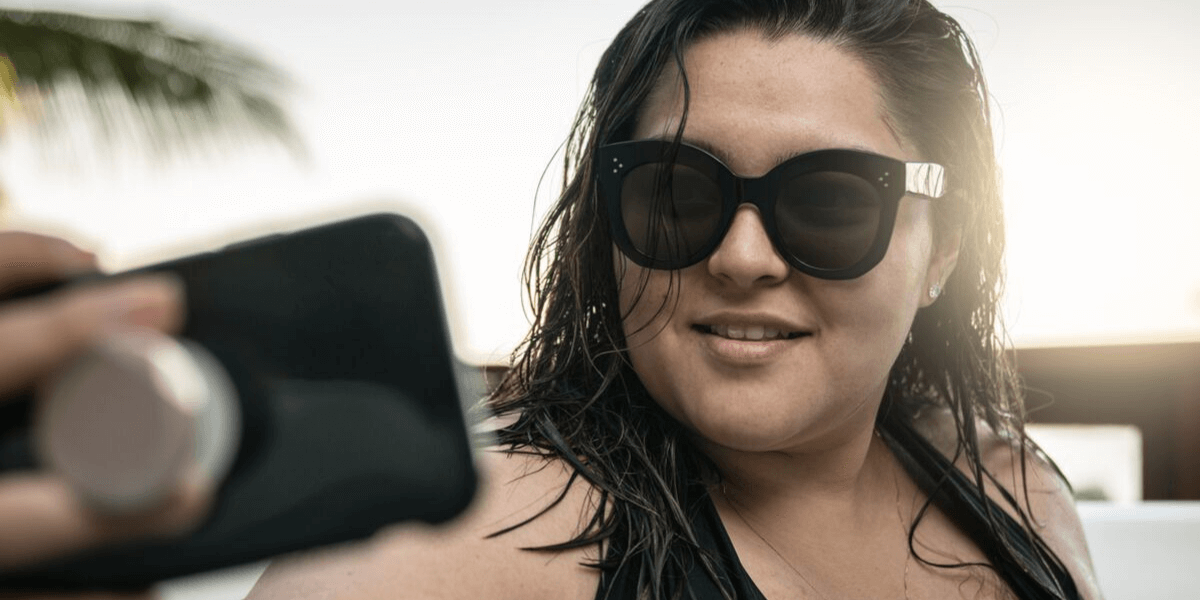
8. Increased Level of Happiness
As you can see, intuitive eating can benefit your mental and physical health, and scientific studies prove this. When you become both physically and mentally healthier, your quality of life improves. This translates to an increased level of happiness and contentment.
How to Get Started with Intuitive Eating
Do you want to give Intuitive eating a try? If you are ready to eat better, feel better, and be healthier, we can help you!
You can access all of our services on our work with us page. We have a number of programs and service levels enabling us to serve most women:
Free Resources and Masterclasses: Get started and get to know us better!
Private coaching with Stephanie and her team Stephanie and her team of Certified Non-Diet Coaches are waiting to support you in a one-to-one setting with an individualized plan.
Undiet Your Life group coaching program is for women to learn how to eat intuitively, become body neutral, and learn self-coaching at their own pace while being supported in a group setting by Stephanie and her team of Certified Non-Diet Coaches.
Non-Diet Coaching Certification for professionals ready to integrate the Going Beyond The Food Method™️ in their practice and for women wanting to become Certified Coach and build a business coaching other women beyond the food.
What is Body Neutrality?
What is Body Neutrality and how is body neutrality going to help me ? That one of the most frequent question from client inquiring to work with us. before I answer this let’s consider the following statistics…
In Glamour Magazine study found that 97% of women are “cruel to their bodies” every day.
Research released by Dove, for their ‘Self-Esteem Project’, found that 96% of women in the UK reported feeling anxious about the way they look, compared with 86% in China, 72% in Brazil and 61% in the US. Only 4% of the women in all the countries surveyed would consider themselves ‘beautiful’, and by the time girls reach 17, 78% will be ‘unhappy with their bodies’.
In fact, current media ideals are achievable by less than 5% of the population – and that’s only if we’re thinking about weight and size. When we add shape, face, muscle tone etc into the messed-up mix, it’s probably going to be around 1%. 1 percent
Are you a statistic?
I was for years until I discover Body Neutrality.
That’s a question I receive very frequently… we are somewhat used to term body positivity but body neutrality not so much.
What is body neutrality?
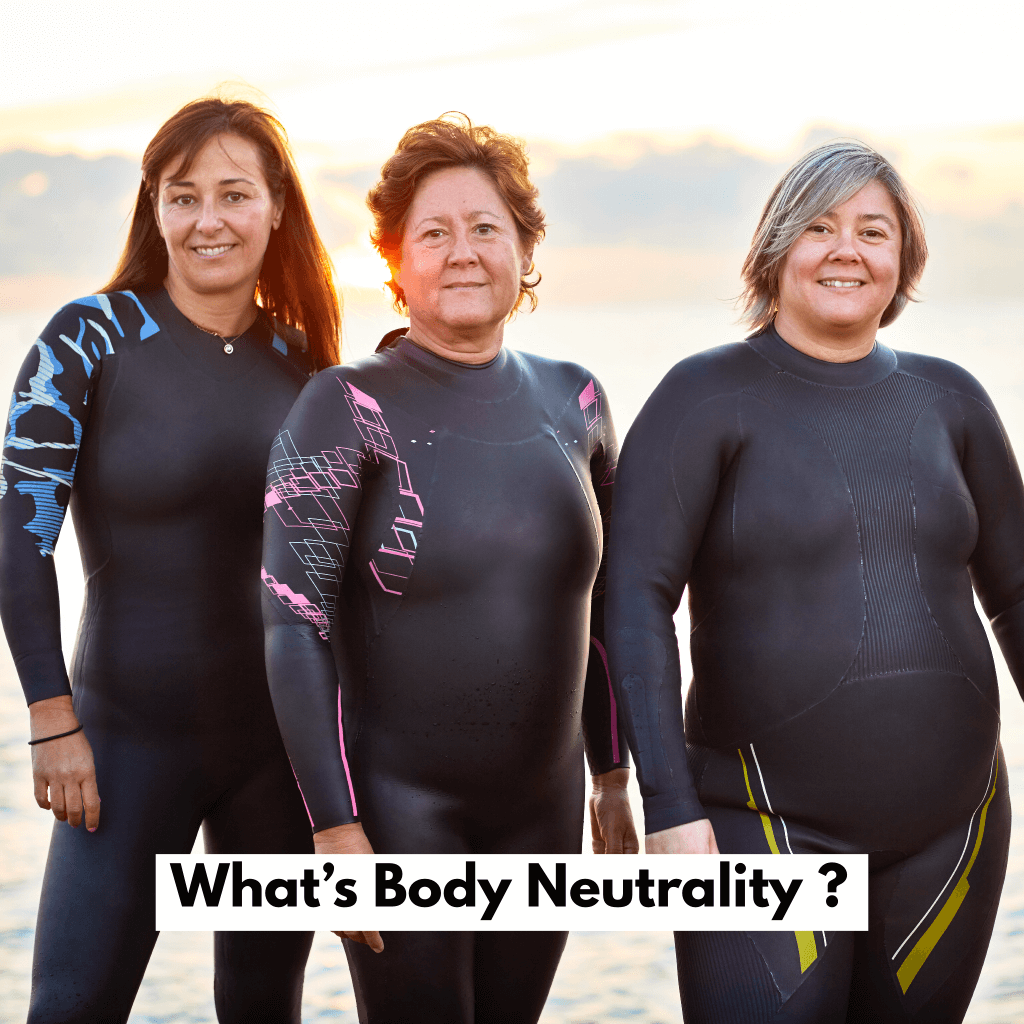

What is body neutrality?
Body Neutrality empowers you to embrace yourself as you are, including the parts you don’t like about yourself.
Its focus is to avoid self-hate while simultaneously reliving you from the pressure of having to love your body.
The goal is to respect and accept your body for what it is – and that’s it.
Body Neutrality recognizes that not everyone is going to love every part of themselves all the time because that’s an unrealistic expectation to say the least.
The reality is that some days you’re going to look in the mirror like ‘Dam it, yeah, thank you legs for letting me travel, thank you arms for allowing me to type this inspirational post and thank you belly for creating life!
And then there’ll be those days where you stand in front of the very same mirror, focusing on that cellulite you hate or the wrinkle that suddenly seems so obvious.
Body neutrality versus body positivity
Embracing Body Neutrality over Body Positivity allows you to experience negative feelings about yourself, but without the pressure that comes with having to be positive all the time.
In other words, it’s a middle ground between positivity and negativity (shaming) – that’s neutrality.
Body Neutrality is the safe bridge between body shaming and body positivity. It’s about being grateful for your body and everything that it does for you because it does a lot. You are alive right now right!
So Body Neutrality is centric to the process of accepting your body.
Body neutrality & intuitive Eating
For many of us we’ve have years of suffering thru body shaming and along the way we’ve picked up coping behaviours to neutralize the pain the pain associated with body image struggles.
Being the victim of body shaming, most of it from our own mind, is difficult to say the list so now wonder that many of us have become along the way emotional eater or binge eater.
Combine the suffering that comes along with body shaming with the notion that food is the gateway to “loving our life and body” food has become this enemy that we need to control in order to end the suffering.
Healing our relationship to food is necessary in order to make peace with our body. Intuitive eating is the way in which you can achieve both: body neutrality and peace with food.
Intuitive eating teaches to respect your body.
Intuitive eating teaches to respect your innate body messages such as hunger and fullness so you can have a healthy and respectful relationship with your body.
What is intuitive eating?
Intuitive eating is proven and well-researched self-care eating framework that makes YOU the boss of YOU.
Intuitive eating teaches us to have a healthy relationship to food empowering you to trust your ability to meet your needs, distinguish between physical and emotional hunger and ultimately develop body wisdom.
Get started with intuitive eating
If you’d like to explore intuitive eating and discover how it can help you make peace with food download our Get Started with Intuitive Eating Guide.
This free (and highly detailed) cheat sheet will give you a 3 easy to follow step process to help you get started with intuitive eating right away (and give you a shot of confidence to stop dieting … perhaps ).
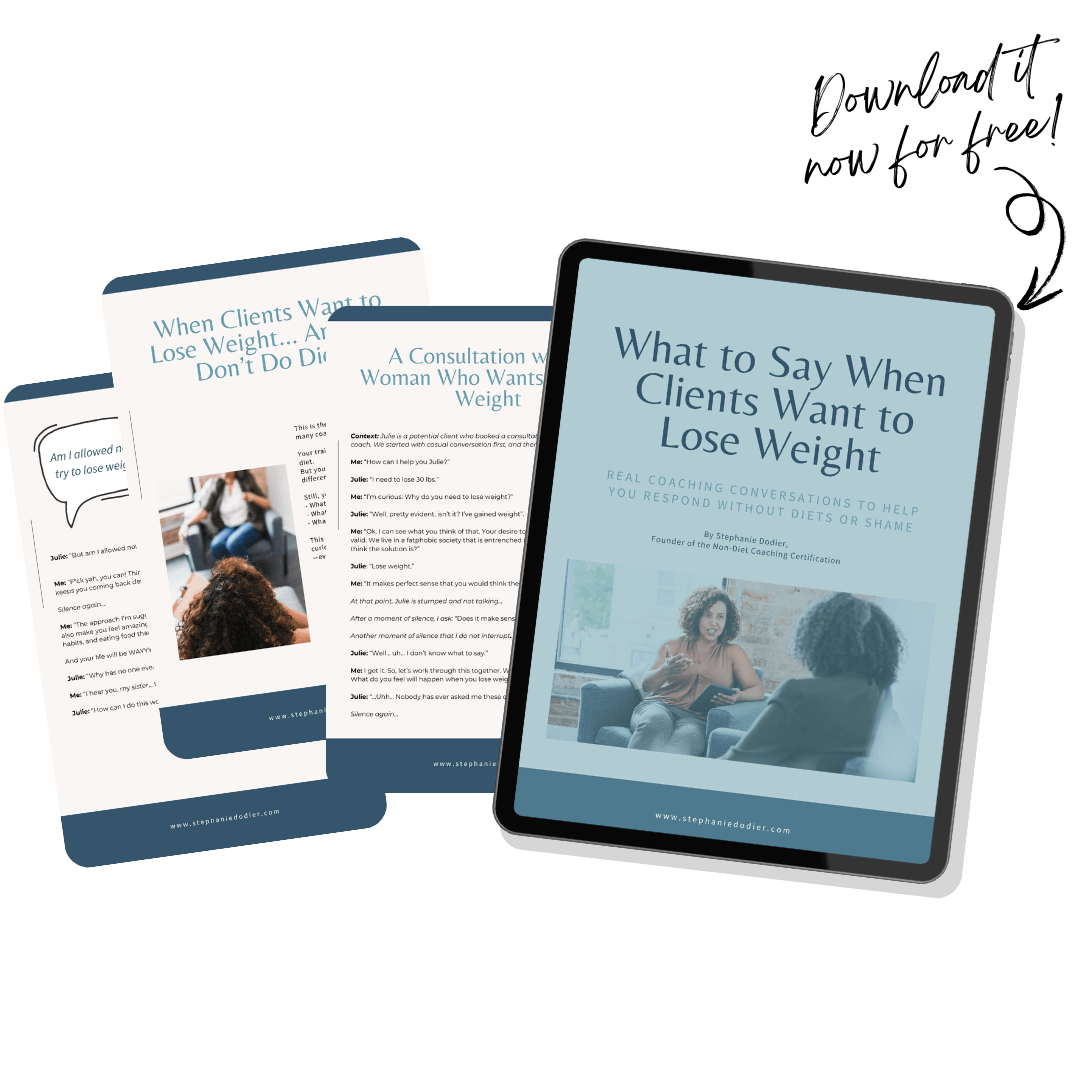

FREE GUIDE
What to say when a client want to lose weight
GET THE EXACT WORDS I USE IN REAL COACHING SESSIONS—WHEN WEIGHT LOSS COMES UP AND I’M HOLDING A WEIGHT-NEUTRAL STANCE


FREE GUIDE
What to say when a client want to lose weight
Get then exact word I use in real coaching session when weight loss comes up and I’m holding a weight-neutral stance
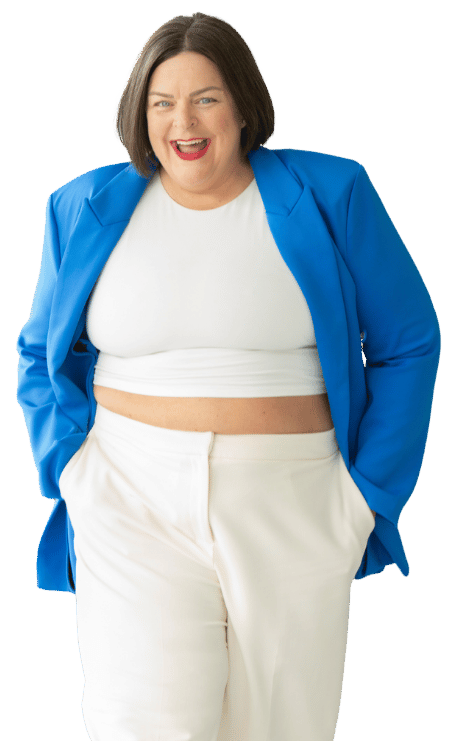

Welcome!
I’m Stephanie Dodier
I am a non-diet nutritionist, educator, and feminist business leader challenging everything we’ve been taught about food, health, and coaching.
I help health professionals confidently coach food and body without co-opting diet culture.
Join me in leading the health coaching revolution!
Ready? Let’s do this!

